Whimper

Johannes Vermeer: The Concert (circa 1664)
"Thanks for coming to my table."
The final essay in my Authoring Series should wrap up my investigation, and I suppose that this piece might manage to do precisely that, though it won't succeed in the way I'd imagined it might when I started this series three months ago. Then, I had the writer's equivalent of visions of sugar plums dancing around in my head, for I, as seems so often the case, began this enquiry under innocently false premises. I'd imagined that Authoring might result in some sort of a publishing contract and a physical book sitting coquettishly on some bookstore shelf somewhere. How nineteen forties, right? We're in the twenty-first century now and you might not remember the last time you set foot inside a bookstore, and online book shopping's different enough to not really qualify as book shopping at all. Further, the book market has been static since 2007 when 400,000 new titles were shoved into it. Today, four million new titles compete for the same shelf space, much of it virtual. My publisher, the one who published my best selling The Blind Men and The Elephant back in 2003, reports that the only books that stand much of a chance in today's cluttered market are ones tied to an existing marketing plan, a subscribed workshop offering or a frequent keynote speaker. That's not my manuscript. It's not my aspiration, either.
It might be that Authoring's no longer as I imagined it might be back when I started this enquiry.
Patience

Vincent Willem van Gogh: Rain (Saint-Rémy, November 1889)
"Whatever it becomes, comes later."
I don't fear that we'll not get clear through all of Authoring's Stations of the Cross before we run out of time to explore them here, I know for certain that we'll run out of time. Running out of time seems Authoring's common companion, for Authoring as a craft and as a profession turns out to be one of the longer cycled occupations. This seems fitting if only because once published, a manuscript becomes essentially immortal. Even if it joins the ranks of the majority of published works and gets quickly returned for pulping, those three copies submitted to The Library of Congress will account for something, and anything shelved in that permanent collection remains forever retrievable. That said, Authoring's Fifth Station of the Cross simply must be Patience, for Authoring will not be rushed. Even the fast track to publication seems terribly pedantic, with checks and unbalances complicating each and every step. Even then, an error or two might occasionally get chiseled into granite, but the intention of publishing flawless works mostly works. Authoring features innumerable moving parts.
My folly at setting aside a quarter year to consider Authoring says much about the profession.
Promotion

Sassetta AKA Stefano di Giovanni: The Agony in the Garden (1437-1444)
"This Fourth Station ain't worth my tarrying over."
And so we come to the Fourth Station of the Authoring Cross, Promotion. I have nothing authoritative to say about Promotion, for I have never mastered it. The real underlying reason I began this enquiry into Authoring had everything to do with Promotion, and, specifically, SelfPromotion, which I've long recognized as my Achilles Heel, as I explained in my earlier Reconsidering series. For someone with a degree in Marketing, I seem a particularly inept marketer. I shudder whenever I'm called to say a few supportive words about my work and either feel as though I'm bragging or underplaying, often both. I had hoped that a more focused considering of Authoring might enable me to find a more comfortable frame within which to place this Fourth Station and its many expectations, but as I watch the calendar moving toward the expected ending of this endeavor, I realize that I'm no closer to feeling any more comfortable with promoting my work than I ever was. I feel as though I've played this game to stymie again after specifically re-engaging again to learn how to play around or beyond stymie. I feel about ready to accept that I actually am me, and that the earlier instances of myself which I thought were perhaps just underdeveloped manifestations might have been instead finished pieces and I've been in denial for decades. This result does not surprise me.
I've been shopping the usual marketplaces.
FutureFocus

Georges de La Tour: The Fortune-Teller (probably 1630s)
"The universe couldn't care less what you decide."
Much of whatever Authoring entails occurs on the broad plain between writing and publishing. There, the Fundamentally Unanswerable Questions reside, serving as apparent barriers between the writer and his aspiration to become a published Author. These questions also serve as the raw material for utterly transforming the Authoring experience both for the better as well as for the worse. As barriers, they reliably produce what certainly feels like worse experiences, at least until they encourage some breakthrough thinking that transcends the initial trouble. What started as a continuation of the story about writing evolves into a deeper and richer story situated above and slightly to one side of the writing as well as to whatever story the manuscript attempts to tell. This perspective emerges from what seems like overly extended wandering in wilderness, from an abject loneliness and deep isolation, from genuinely not knowing, the sure source of all understanding.
Authoring's Third Station of the Cross might well represent the lion's share of the whole Authoring experience.
Voce

Orazio Gentileschi: David Contemplating the Head of Goliath (c. 1610)
" … it's absolute magic!"
I'll call the Second Station of the Authoring Cross Você [pronounced Voe Che], because it mostly deals with the Author's manner of speaking. The writer writes while the Author shapes. The writer creates rough approximations in relative isolation, each piece produced in absence of any broader context. Once the writer completes the pieces, the Author can set to aligning those chunks into a more continuous whole. Você becomes primary among the various elements of this aligning process because it's the subtlest piece and also the one most easily noticed as absent. The voice the reader finds speaking out of the page must be recognizable, not different from chapter to chapter, beginning from end. Further, the Você stands above and beside the story and serves as the medium within which whatever story gets told. It's often best when as innocuous as the almost still and silent voice each of us knows as our own internal one, our conscience, if you will. Whatever the Author chooses as the work's Você, aligning and preserving that timbre might be the underlying purpose of the so-called Proofing pass, which superficially seems to mostly focus upon spelling and ridding the draft of dangling participles.
A great editor can preserve and even amplify the Author's voice better than even the Author could.
TinyShifts

Coëtivy Master (Henri de Vulcop?): Philosophy Consoling Boethius and Fortune Turning the Wheel (about 1460–1470)
"The greatest significance tends to hide in the tiniest focus."
I yesterday mentioned The Authoring Stations of the Cross, my sense of Authoring's underlying sequence. My sense has shifted since I started this Authoring enquiry, but shifted in unanticipated ways. Like you (I suspect), I focus upon what might make a big difference, figuring I can always fine tune the tiny side stuff, so I set about looking for whatever might make a huge contribution in my understanding of Authoring. As I near the end of the enquiry, I realize that TinyShifts seemed to have made the most significant differences, perhaps a contradiction, though not, upon reflection, a particularly surprising one. If change sometimes seems frustrating to create, it's often due to focus. I'm so intent upon seeing significance that TinyShifts slip right through my diligence. My futures tend to slip in when I'm paying attention to stuff that couldn't possibly make much difference. Authoring's no monolithic practice, but a series of almost insignificances only the experienced appreciate. Authoring's very likely to slip right past even the attentive at first because us attentive ones tend to focus upon the wrong scale, by which I mean, way too large.
I see now that if I shift just a couple of things in my daily practice, I will have much better integrated Authoring into my routine.
InfiniteObjectives

Artemisia Gentileschi: Danae (c. 1612)
"It's infinite engagement or its meaningless …"
With a scant week left in my scheduled Authoring investigation, I stumble upon an understanding that might have better served me at the beginning. It's really no great tragedy if I prove myself to be too late smart again, but then I wonder how this inquiry might have proven different had I achieved this small enlightenment nearer the beginning of this effort. Looking back, I realize that I might have frittered away quite a lot of time failing to winnow whatever I was up to into a finite form, as project management theory and practice have always counseled. The job of the proper project manager was always said to involve building baffles and defining edges such that the 'process' as well as the product might be thoroughly described in definite language, without hyperbole or abstraction, for the tools and techniques of 'proper' project management each utterly depend upon thorough grounding. No Utopian notions allowed. No notions allowed at all, only tangibles.
I long ago wrote a piece about solving the world hunger problem, which I characterized as an aspiration, not a realizable objective.
ComFormation

Artemisia Gentileschi: Judith and Maidservant with Head of Holofernes (1608)
" … just so much spit in an indifferent wind."
Half of the people I'd Bcc-ed on the manuscript submission email found that message in their spam filter, so it seemed a reasonable assumption, a fifty/fifty proposition, that the publisher's spam filter had also snagged my missive. I explained yesterday how hesitant I felt about calling to confirm receipt, wanting to avoid appearing pushy, but after further goading from my supportive community, I took the chance and quickly confirmed that the publisher had, indeed, received the thing and was warmly anticipating reviewing what I'd submitted. In that moment, a line of communication manifested, its first message comforted more than I can describe. The manuscript had survived another passage from source to out there and it had found another interested reader. The publisher, too busy to review the damned thing yet, warmly anticipated reviewing it. He promised to get back to me just as soon as he's finished his perusal. That should be soon. The Blind Men was submitted and accepted in the same week. This one, accepted or rejected, should prove little different.
The often lengthy periods between submission and ComFormation hold no substance.
StageFright

Orazio Gentileschi: The Lute Player (1612)
"I'm just barely learning … ."
Once the manuscript's submitted, a form of StageFright settles upon the budding Author. He wants feedback but dreads it. He wants acceptance without suggestions, especially those damned helpful ones. Part of him hopes his submission just gets lost in the mail. Should the package return, he might file it on an easily overlooked shelf and conveniently forget to open it rather than submit to the judgement of the world out there. It might be a special curse that those who engage in the performing arts—and make no mistake, Authoring qualifies as a performing art—all suffer from some degree of StageFright. We desperately want to share our gift, however modest, with a world that deep down terrifies us with its casually harsh criticisms. Formally trained artists get themselves subjected to toughening up exercises as a part of their studies. They're taught to dish out harshness and also to take it in huge volumes so that they might relegate others' judgements into mere background noise. They learn not to take that shit very personally, to interpret criticism as first about the critic, and to thereby hold their creative space. Even the trained ones, though, experience a kind of StageFright as a form of respect for the performing space, which should rightfully always awe an artist at least a little bit, lest they grow calloused about entering it.
In my youth, my first real career was as a 'single acoustical artist,' as a so-called singer songwriter.
ReConsidering

Unknown: The Stigmatization of Saint Francis,
and Angel Crowning Saints Cecilia and Valerian, French or Italian (1330s)
"I've done dark wood before."
Three years ago, I spent the whole first quarter of the year Reconsidering. I was then a year and a half into what has now turned out to have been a nearly four and three quarters-year effort, one within which I've dedicated a part of myself to writing and posting a daily essay. I began the exercise to remind myself that I was, or had been at one time, a writer. I suppose that I quickly reassured myself before falling into a rather tender trap, one which insisted that if I really was a writer, I should be writing daily, or, perhaps I'd really need to continue daily writing or lose my identity as a writer. Whichever, I've continued the practice, which you've doubtless noticed. Every morning another reflection arrives. I finished my Reconsidering series on March 20, 2019, while visiting our then rented out home in Walla Walla, the final reflection, reassuring. [Link here.] Now, that series exists as a book, or, more properly, as a manuscript, as of yet unsubmitted for publication. I've carried the presumption that one day, Reconsidering would certainly reach publication, but my more recent focus upon Authoring finds me reconsidering that earlier presumption for that one and its soon to be nineteen brothers, as well as those two others I've written and should some day get around to properly compiling into submittable form. I do not lack for product.
One of the more useful outcomes of any investigation might be the inevitably different perspective focused perception produces.
Spent

Lewis W. Hine, photographer: Tony Casale, Newsboy, Hartford, Connecticut (March 1909)
"It might be that his urge toward Authoring was a big mistake."
This announcement will not make headline news. It won't make the back pages, either. After seventy-seven days Pursuing Authoring, our budding Author's feeling Spent, like a spawned out salmon gasping in the shallows of his home stream, wondering what that excursion might have meant. It certainly seemed circular, a round trip, there then back again, but what was gained and what might have been lost? What was that purpose again? What initiated the urge, the one that pushed the fish out of sufficiency into an apparently necessary pursuit. The long and tedious descent to sea level, the lengthy period feeding in the open ocean, the perilous return up fish ladders and over dams, dodging sea lions and gill nets, what was all that drama about? Our fish feels reasonably certain as he watches his once-noble nose turn crooked and rotting that this might not have really been about him, that he was only playing a part in a much wider and longer arc of history, a bit player, an instance. Whatever the purpose or the reason, our fish feels certain he's Spent, done for now, over, finished.
This is the point where the Author steps in to make light of the gravity of that opening paragraph. What? He isn't?
Serializing
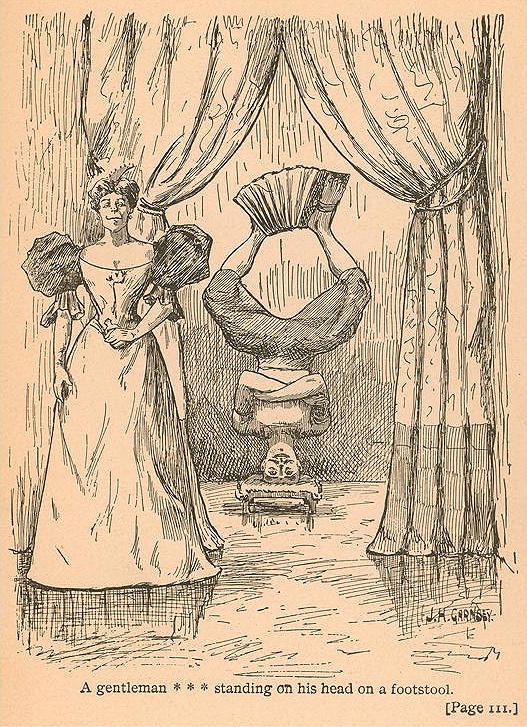
J. H. Garnsey: A gentleman . . . standing on his head on a footstool,
from Billtry, by Mary Kyle Dallas (New York: The Merriam Company, 1895).
An illustration from a dime novel.
"Whatever produces Ink, works."
A hundred and fifty years ago, many popular novels were published twice. They were first Serialized in a newspaper or weekly magazine, then later compiled into a book, sometimes in different editions ranging from cheap dime novels to leather bound presentation finishes. By the time a Dickens novel was published, it had already been read by tens of thousands, each novel already a best seller at the point of publication. The blog, I guess, replaces such Serialization in today's publishing world. For an Author, Serializing offers one great benefit over simply publishing books, a more frequent experience of "Ink," the term Authors use to describe what it feels like to see their work in print. We say that we've received ink as if we'd received a blessing or a sacrament or something similar. It might serve as the true purpose of Authoring, to receive a jolt of recognition when spotting one's own writing upon a page.
It doesn't matter to us Authors, either, whether that Ink comes in the form of a Letter To The Editor in a newspaper or a hard bound book
KnotKnowing
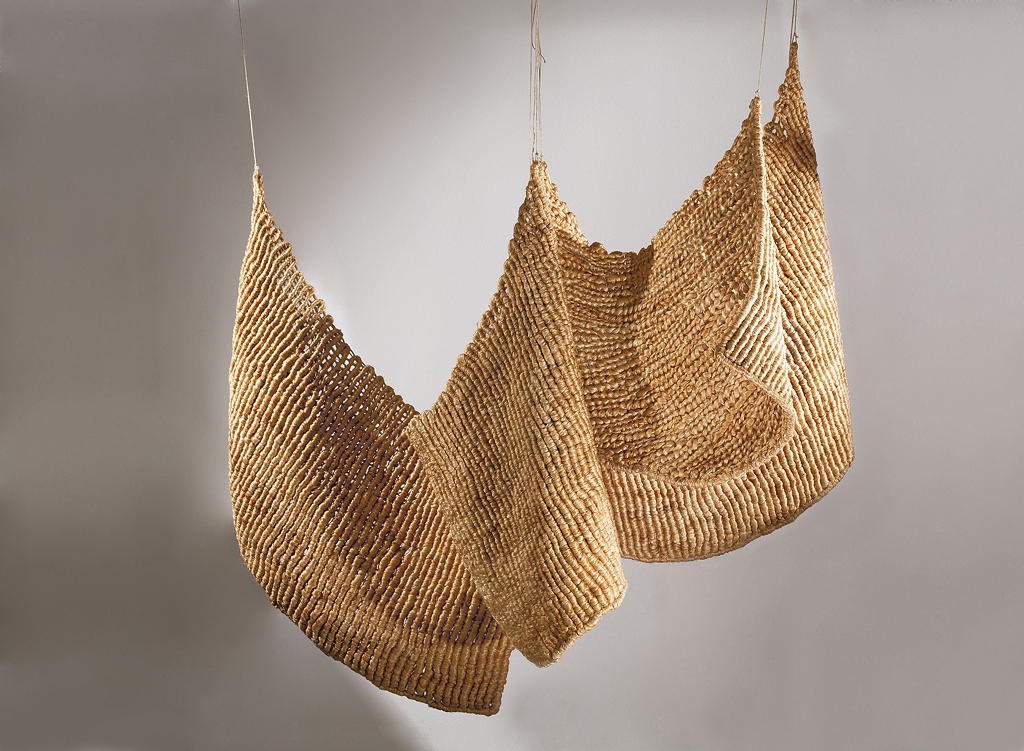
Aurèlia Muñoz: La font de la vida [The Source of Life] (1976)
"David The Rather Mediocre Author But Still Perfectly Normal"
Authoring has thus far offered me an extended experience of not knowing, KnotKnowing, by which I mean coming to discover that I'm tangled up in another Gordian Knot again and again and again. These knots seem to be the kind that cannot be simply untied, though a few have proven vulnerable to a blade. I have, like Alexander The Great (back when he was still widely considered Alexander The Rather Mediocre) just cut the untenable knots in half, thereby untying them after a fashion, but I have proven almost always incapable of conventionally untying them. My inability to succeed at conventional untying first came as a blow to my delicate ego. I felt that if I was really going to ever become worth anything as an Author, I should most certainly be capable of untying most any conventional knot, but I clearly was not. This acknowledgement reverberated down through my spirit to weaken my resolve as well as my self esteem. I felt as though I must have been proving to be a truly terrible Author.
Part of my difficulty arose from my insistence upon attempting to answer the wrong questions.
AllIn
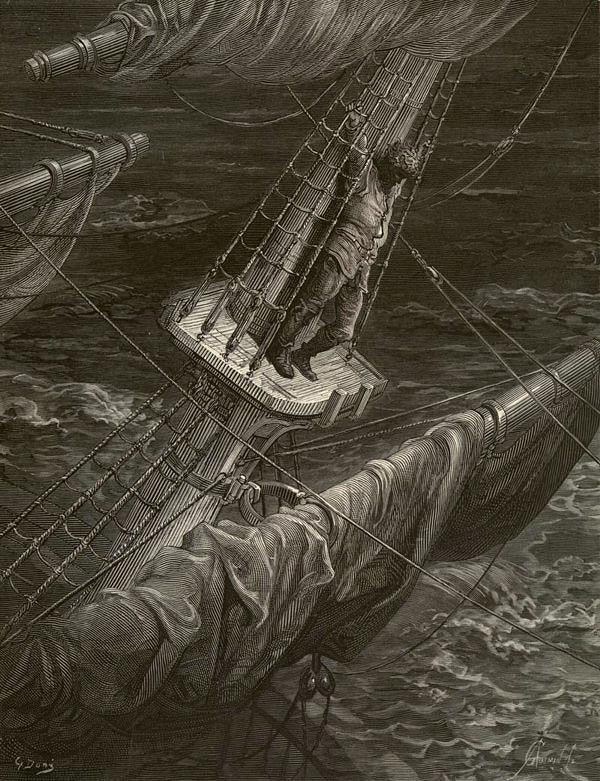
Gustave Doré: Rime of the Ancient Mariner (1877)
"AllIn and then some … "
When I started this Authoring Series, I went AllIn. Like you, I was reared on the gospel of commitment. If I was going to do something, I should fully engage rather than dabble. I should take my engagements seriously. Consequently, my work has generally become my identity more than my occupation. I understand that when we declare what we do for a living, we say "what we are," this while also insisting that we maintain work/life balance, whatever that might be. For me, my work has usually been my identity, or perhaps I should say that I have largely mistaken my work for my identity. I do seem to become whatever I'm doing. When I throw on my overalls, I become Handyman Dave for the duration of the chore. When I play my guitar, I become David, my single acoustic performing artist self circa 1975, not having aged a minute. When I cook, I cook rather than dabble around the edges. The very minute I started this Authoring Series, I became an author for all intents and purposes. The Refurbisher I'd been the previous quarter disappeared as I focused my attention, heart, soul, body, and spirit on Authoring. Who am I really? Interesting question.
Of course, I was just play acting, for I had few clues then just what Authoring entailed.
CopingBetter

Sir Eduardo Paolozzi: Meet the People (1948)
"What's that latest book about, David?"
Once an insight visits, the real work begins, to interpret and explain it. The initial insight passes quickly. It might linger for less than a minute, perhaps less than a second, a flash of lightning, difficult to believe it was ever there once it leaves. The interpretation relies upon observational memory, the type of observation taken when blinking, uncertain anything was even seen, but fueled by a flush of conviction. Something terribly profound just happened. Let's not let it get away from us, now.
The first impression might serve as little more than an anchor for the receiver of the insight, an index, a reminder.
Cogitation
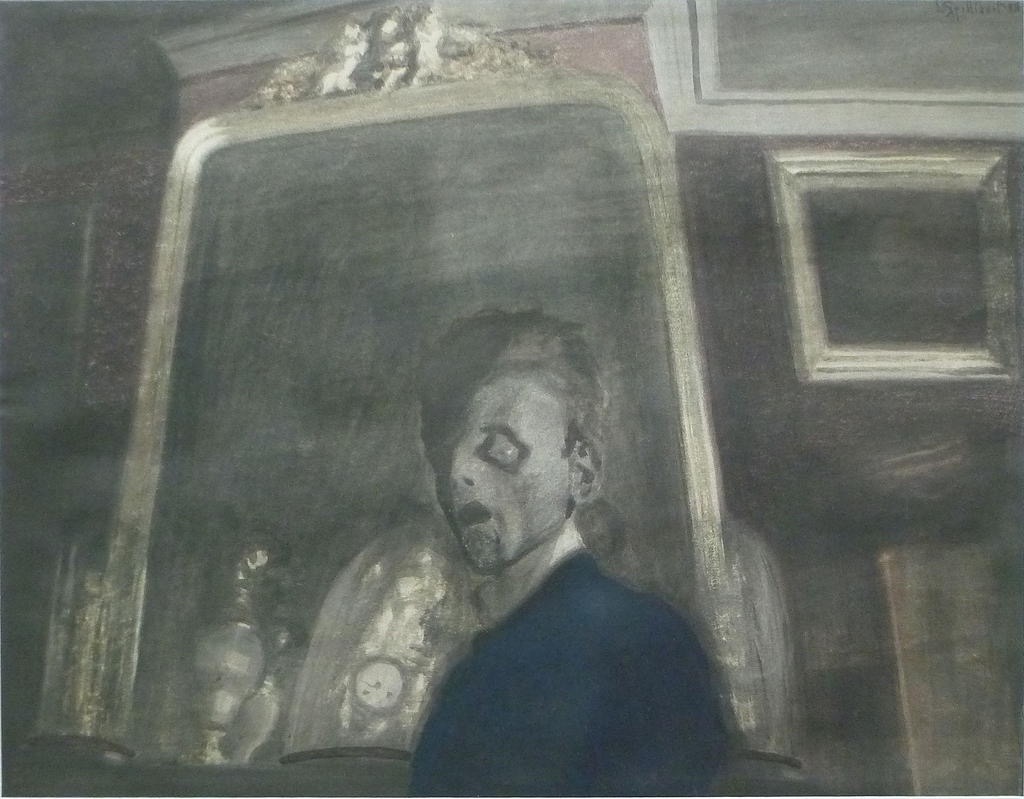
Léon Spilliaert: Self-Portrait Before the Mirror (1908)
"This Authoring's convoluted business …"
Looking back through my accumulated Authoring stories, I discover that I almost two months ago posted one entitled Cogitating which considered the long contemplative periods Authoring also entails. Today, I want to take the noun form of that same idea and explore where that might lead me, though I already know that, being a noun form, it won't contain much action or acting. As a budding codger as well as an Author, I perform much of my magic via Cogitation, by which I mean by apparently doing nothing. I excuse myself by explaining that I'm considering, thinking, figuring out, though I'm clearly not any sort of action figure while so engaged, if, indeed, I can even fairly describe myself as engaged during those times. I have gratefully not resorted to watching daytime television—how could I live with myself then?—but to any outside observer, (how did YOU get in here, anyway?) I might easily appear to be simply, perhaps profoundly slacking, and I might be slacking. The evidence that my Cogitation might bear fruit remains firmly in the grasp of the future tense during these lengthy periods. Cogitation accomplishes nothing, and without evident elegance, either.
I could probably pass for a retiree, if I would only allow myself to retire, but I remain tenaciously engaged even when, even if, I seem awfully disengaged.
WrongQuestion
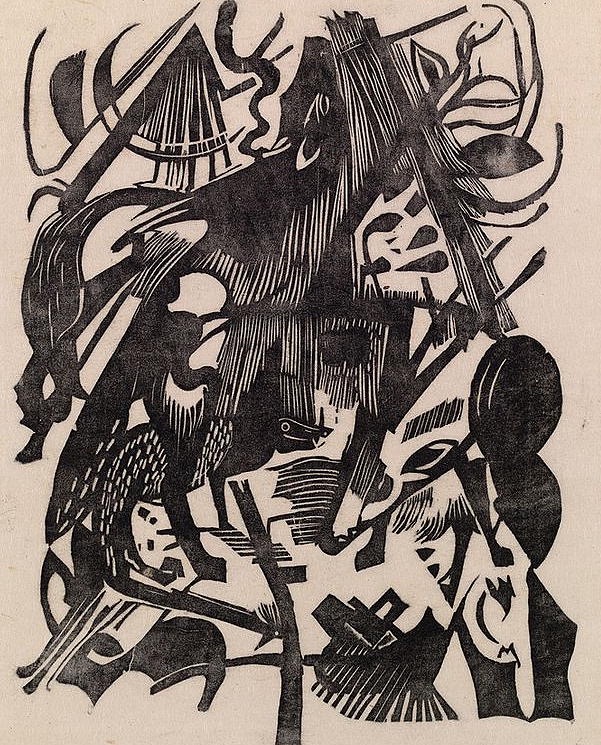
Franz Marc: Birth of the Wolves [Geburt der Wölf]) (1913)
" … this tactic sometimes even works … "
They always ask the WrongQuestion, probably because there are no completely right and proper ones. The purpose of asking WrongQuestions might vary a bit from what we might innocently consider the purpose of asking a proper question, presuming, of course, that such questions exist. The purpose of asking WrongQuestions might extend no further than a desire to start a conversation, like when someone asks Fundamentally Undecidable Questions, though those might prove both right and proper. The difficulty, or at least a chief difficulty, arises when one presumes that a WrongQuestion is, in fact, a right and proper one, and being right and proper, that it deserves a right and proper answer. Therein begins the trip down into a rabbit hole and into an often inescapable labyrinth.
There are tells, clues that the question offered might prove problematic.
TimeLagging

Gustave Doré: Found in the Street (1872)
" … trust in my experience, even when it seems, at best, half-vast."
The Muse knows that if she wants to understand my perspective, she'll have to ask and then … … wait, for I never seem capable of responding instantly with any status request. Ask me what I think and my first reaction will be to wonder, "Was I supposed to be thinking?" I'll need to sort out some fairly hefty existential baggage before I'll muster a response. Asking me how I feel about something should spark an even lengthier delay, for I do not keep my feelings within easy reach. My mean lag time between intention and engagement tends to be lengthy, too, as I seem to need to consider most things through to some point of leverage before physically starting, so it might well seem as if I had been actively forgetting to follow through rather than spooling up for my opening gambit. I have proven to be a most frustrating partner.
I am a frustrating partner for myself, too.
ThatVoice
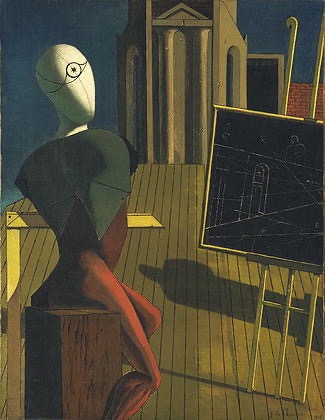
Giorgio de Chirico: The Seer, Winter 1914–15
" … wondering if my Authoring voice might ever gain parity or prominence."
I have a voice in my head. Or is it that a voice in my head has me? Either way, there's a voice up there, though I'm uncertain if that voice belongs to me, if it's mine. Like when I hear my voice on a recording, this voice doesn't very much sound like mine, like the one I hear when I speak out loud to myself or to anyone, so I suppose that the voice in my head could belong to anyone. It chatters. It narrates my life. It tells the stories as they unfold before me, as if it had access to the script. Sometimes it reads ahead. It can fill me with delight or dread. It's my faithful companion. When I startle awake at zero dark thirty in the morning, ThatVoice greets me. As I fall asleep in the evening, it wishes me well, often by replaying that day's greatest hits and misses. It's never far and rarely silent.
Radios were originally installed in cars to prevent ThatVoice from having too much influence over each driver, to promote more uniformity and less daydreaming.
Spark

Jan Collaert: New Inventions of Modern Times [Nova Reperta],
The Invention of Book Printing, plate 4
(ca. 1600)
"If I can stay in the game and somehow retain my patience, insight eventually visits …"
When I started this Authoring series two full months ago, I suspected that success would require some fundamental understanding to emerge, though I didn't at the time understand just what that understanding might entail. Authoring involves wrestling with so many simultaneous mysteries that they prove impossible to inventory. It seemed that at least one question was hounding me each morning. Through early days, I found it convenient to just let the mysteries be. Later, the unresolved ones seemed to slow then stall my sense of forward progress. I felt tempted to just put my head down and bull through those barriers even though I knew, or believed I knew, that these were the sorts of barriers that nobody ever successfully bulls their way through. I suspected that something would happen, some seriously uncertain something, which would transform the series and at least contribute to turning the resulting book into something more than mere writing, into Authoring.
Many things just seem to require patience.
Paradigming
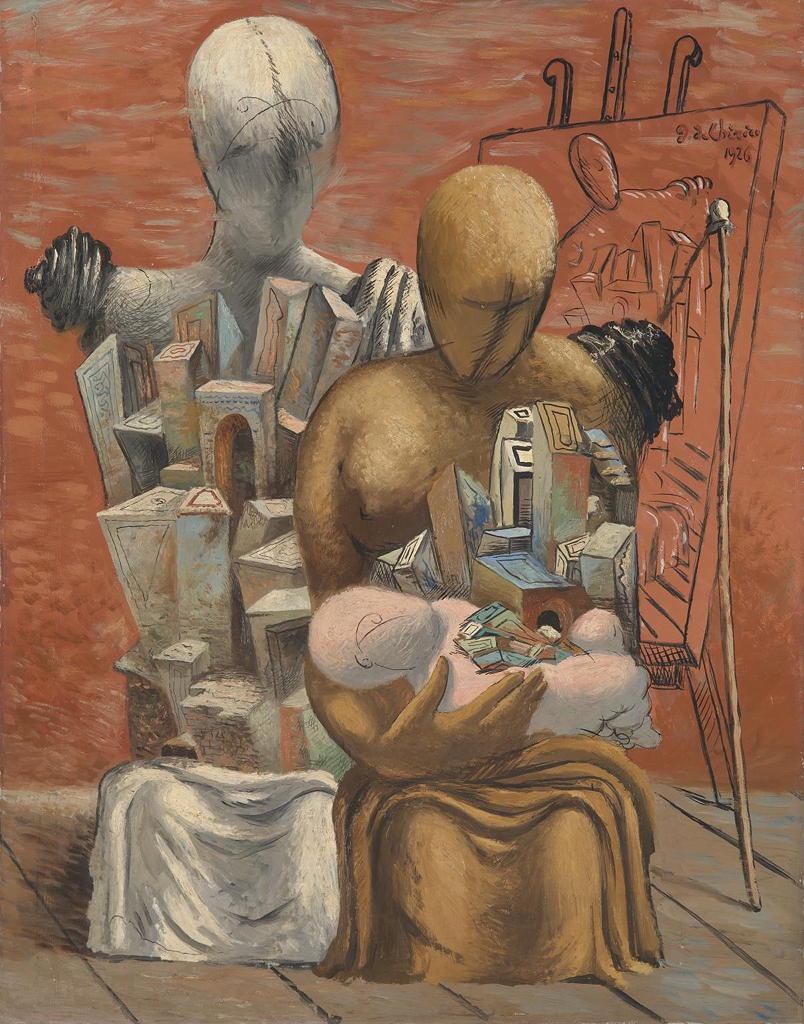
Giorgio de Chirico: The Painter’s Family (1926)
" … from his future turned dystopian on him, he might caution others to be wary …"
I want to have written a book of unique form rather than just another copy cat derivative work. All books seem very much alike in that they feature a number of pages tucked between covers, called "boards" in the trade, but the old adage that you can't tell a book by its cover also holds true for a book's form. A book is not simply a book in that it also holds the potential to transcend what the term book meant before this one came along. Forever after, history will be divided into two components, before this book and after this book. That book's the one, if I'm honest with myself and with my readers, I want to have written, to be writing. I want to believe that's the book I'm presently creating and also the book I have up in manuscript galleys awaiting publication, a great treasure awaiting discovery. A part of me, the rational, more-or-less sane part, understands that this future probably does not stand before me, yet my hope still springs eternal. The result seems to be a generic Want To, Have To, but Can't Dilemma, in no way exceptional, for it might well be that everybody, every writer, painter, chef, and teacher aspires for just this sort of impact and also that it cannot ever be engineered, no matter what. There are good reasons for this to be the case.
First, such Paradigming can only occur after the fact.
TimeShifting
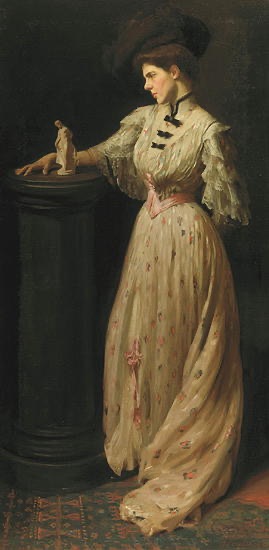
Thomas P. Anshutz: The Tanagra (1909)
"Best if nobody can peek into the workshop while Geppetto's carving."
I write in the wee hours. Everything else in my life, including Authoring, comes after my writing's finished. I try to interface with everyone else's world, but I insist upon at least my writing time each morning, and that sometimes sloughs over. It seems important that my writing occurs early in the morning, under the cover of darkness into dawn. By dawn, I'm almost always finished, cleaning up the mess I always make, completing my final edits, Proofing one or two more times. By seven, I'm free to start thinking about breakfast and to get myself suited up for my day, though the last two years have found me largely suiting up to go nowhere given the Damned Pandemic restrictions, which have suited my lifestyle just fine. By the time The Muse wakes up, I've already put in four or five hours. I live that far ahead of her, I imagine. I'm TimeShifting.
We eat supper together, which might be the only time we see each other all day.
Authdacity
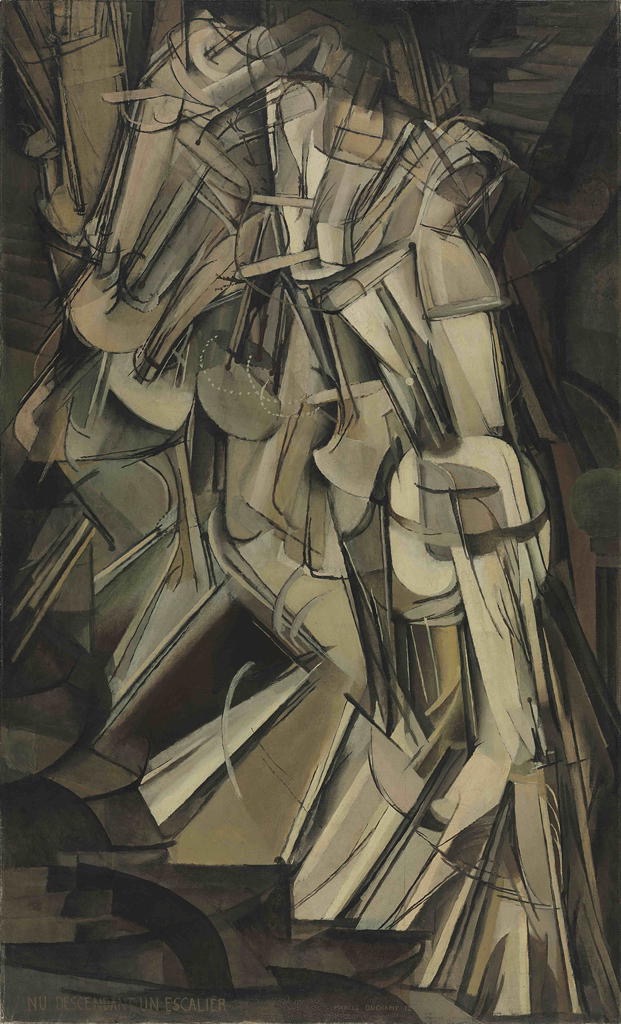
Marcel Duchamp: Nude Descending a Staircase, No. 2
[French: Nu descendant un escalier n° 2] (1912)
"To do it properly means that you must seem to be doing it all wrong …"
The Muse engages in project work, which has always been a curious offshoot of what I might call regular work. Project work seems strange because its primary purpose seems to be to do away with itself. A successful project will work itself out of existence, which seems like an odd foundation upon which to build a career. Further, most professions prescribe practices common to all practitioners. Sure, a few outliers always exist, but the mainstream engage with remarkable consistency, so it shouldn't be surprising if project practitioners, too, usually attempt to adhere to a few widely-acknowledged blessed practices. The Project Management Institute even publishes and maintains what they refer to as a Body of Knowledge, an encyclopedic collection of practices they've blessed for broad application. For an engineering project, these practices might generally work, but project work, being unique, often requires some differences in how one engages. The Muse, for instance, often engages in scientific projects, ones intending to discover something. One does not plan, control, or track a scientific engagement as if it were an engineering assembly effort. Or, I should say, that one shouldn't plan, track, or control a scientific engagement that way. Most try to. The Muse doesn't, wherein lies her mastery. She appears to do it wrong.
I'm learning that Authoring, too, seems to demand some different sorts of management than does other kinds of engagement.
BigChicken
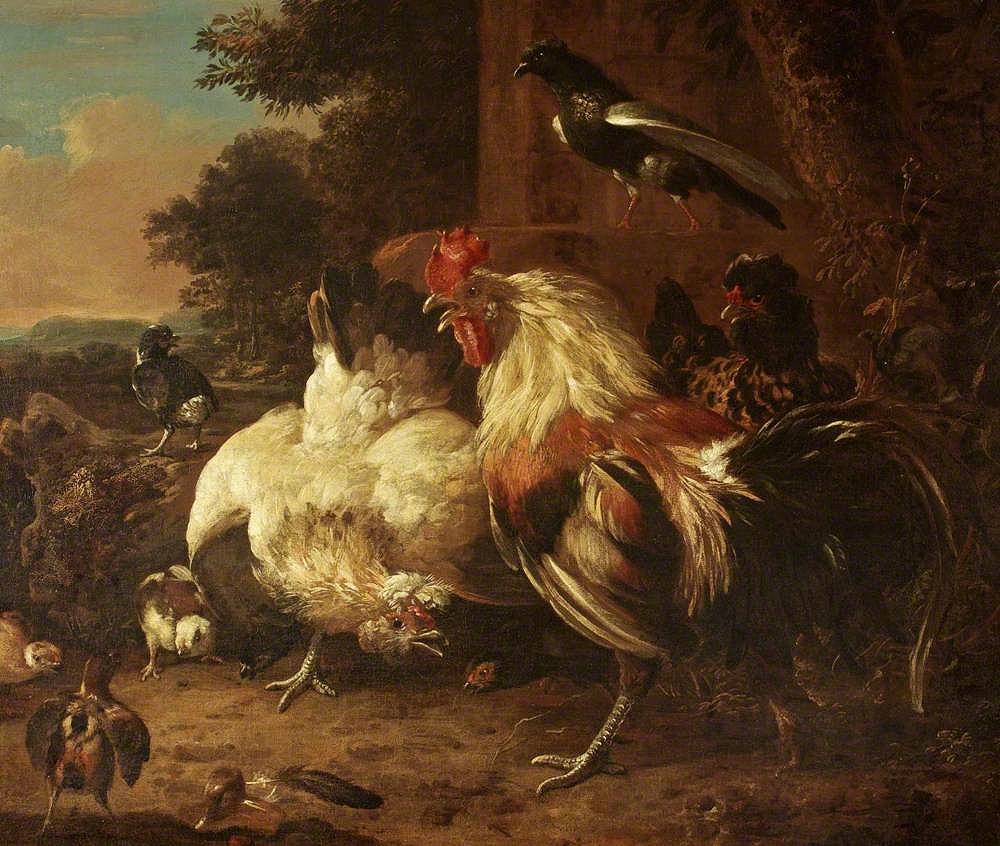
Melchior de Hondecoeter: A Cock and Two Hens, with Chicks, in a Landscape Setting (1656-95)
"A BigChicken will swallow anything."
My face mask might successfully cloak from the usual observer the fact that I'm a BigChicken. Pin feathers successfully tucked in beneath an over-sized N95, and anyone might mistake me for a man. Inside, behind that mask, lies a deep truth and a continual embarrassment. I tend to move forward by first crouching behind. I will not lift up my head to survey the territory before me for the longest time, choosing to nurture terrifying fantasies rather than getting to the normal business of slaying dragons. I am evidently not brave. Oh, I've accomplished plenty in my time, but not nearly as much as I've fled from or declined engagement with. I first imagine failing, and failing big, before getting over it and proceeding.
What courage I do exhibit tends to be of the counter phobic kind.
Systemantics

Peter Paul Rubens: The Incarnation as Fulfillment of All the Prophecies (1628-29)
" … without having yet achieved any maturity."
My Authoring efforts amount to nothing more than my attempts to master another system. An old systems thinking adage insists that learning one system provides insight into all systems, and having learned many systems in my time, adding Authoring to my vitae should not prove utterly impossible, and yet some days it seems as if Authoring might prove special by proving itself utterly impossible to master. The systems thinkers have this contingency covered, too, for as John Gall, system thinker and author of the sadly entertaining Systemantics- How Systems Work and Especially How They Fail (General Systemantics Press: 1975/78, 1986, 2002), all systems are not only part of larger systems but also comprised of many smaller systems, each of which is infinitely complex. Nested infinite complexity explains a lot of what I see when interacting with and attempting to master Authoring, and also what I experience when attempting to interact with even the more mature systems in my life, the ones I might naively expect to perform predictably.
Last week, I pulled into my pharmacy's "drive thru" window, responding to an automated voice message which alerted me to prescription refills ready for me to fetch.
Backsliding

Hans Sebald Beham: Engraving of the Prodigal Son as a Swineherd (1538)
"Backsliding into my future."
After three weeks of steadily improving Spring-like weather, the temperature started falling yesterday and has plummeted down to twenty degrees Fahrenheit (-7C) this morning, with light snow. I spent a rough half hour this morning finally managing to get past LinkedIn's login gauntlet, failing a half dozen times before mysteriously being allowed in, only then to wonder why I'd bothered. I found messages from three years ago and even older, from before I'd last lost the questionable ability to log into that world. I found an essentially infinite queue of long unanswered messages and no evidence of anything resembling my much-touted network, along with what's still the most bafflingly opaque user interface in an industry where bafflingly opaque user interfaces remain the standard. I still can't tell what LinkedIn does, what it's for, it's purpose. The universe seems to be reminding me this morning that progress, once General Electric's "Most Important Product," does not now nor has it ever moved exclusively forward. Once the very epitome of conglomeration, GE has lately been divesting, retrenching back into once core businesses. Progress was ever thus. Even rivers, if one can quiet their mind long enough to observe rather than project what they see, will exhibit prominent backeddies and backwashes along with what we generally perceive as exclusively forward motion. Progress, seen as it actually manifests, proves confusing, a complicated calculus.
And so it probably should be for Authoring, too. It's both Chutes as well as Ladders out here on the cutting edge.
BookSale
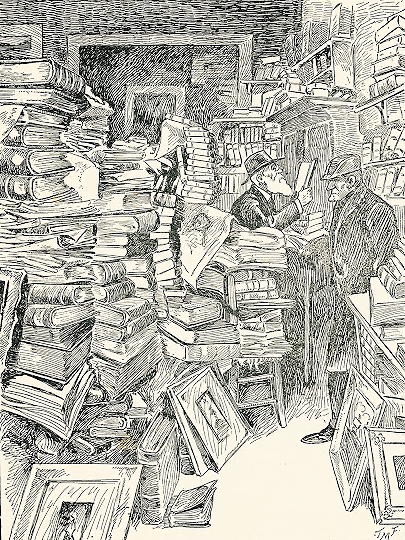
Thomas Fleming: Inside the Old Curiosity Shop. Source: Around The Capital with Uncle Hank (1902)
"I wonder what it might have felt like to live in those days …"
The boxes sit everywhere around this town, in front of shops and stores, clearly marked as present for donations to a BookSale. The local chapter of the AAUW (American Association of University Women) sponsors this annual event as its primary fund raiser. For a weekend, they take over a large conference room at the best hotel in town and fill it with donated books, sorted by general topic and kind, and commence to selling them. This always proves to be well attended. Who wouldn't want to browse through piles of musty books on a February weekend?
The inventory includes all of the usual suspects.
Avant
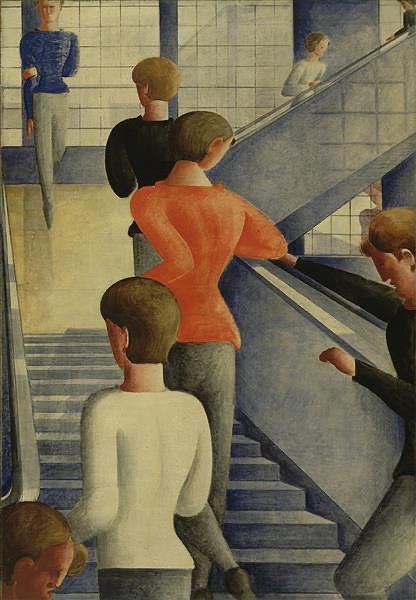
Oskar Schlemmer: Bauhaus Stairway (1932)
" … wisdom can only come after already expending altogether too much time and energy and effort overthinking these questions."
I don't usually identify myself as an Avant guarde writer, but I've been rethinking that notion since The Muse introduced me to a woman who advertises herself as an Avant Gardener. In most ways, I suppose, she's a traditionalist, but she brings a twist to her focus. Sure, she can spout off Latin plant names, but she imagines them in unusual combinations, in places where no traditionalist would ever consider placing them. In this respect, then, she fully qualifies as an Avant designer, Avant meaning 'combining forms.' In a similar way, I guess, I might qualify as an Avant writer, since, I, too, combine forms to produce a unique result. Reading one of my manuscripts produces different sensations for me than does reading others' work. I thought the differences mere quirks at first and found myself rather embarrassed by them. As I've reflected upon my experience, though, I see a sort of signature emerging. This must be emblematic of David's writing, how he does it. It's not precisely wrong, but different. Whether it produces pleasing sensations might be a different question.
One should always question how to judge the quality of any Avant creation, for comparing it should properly prove problematic.
Detritus
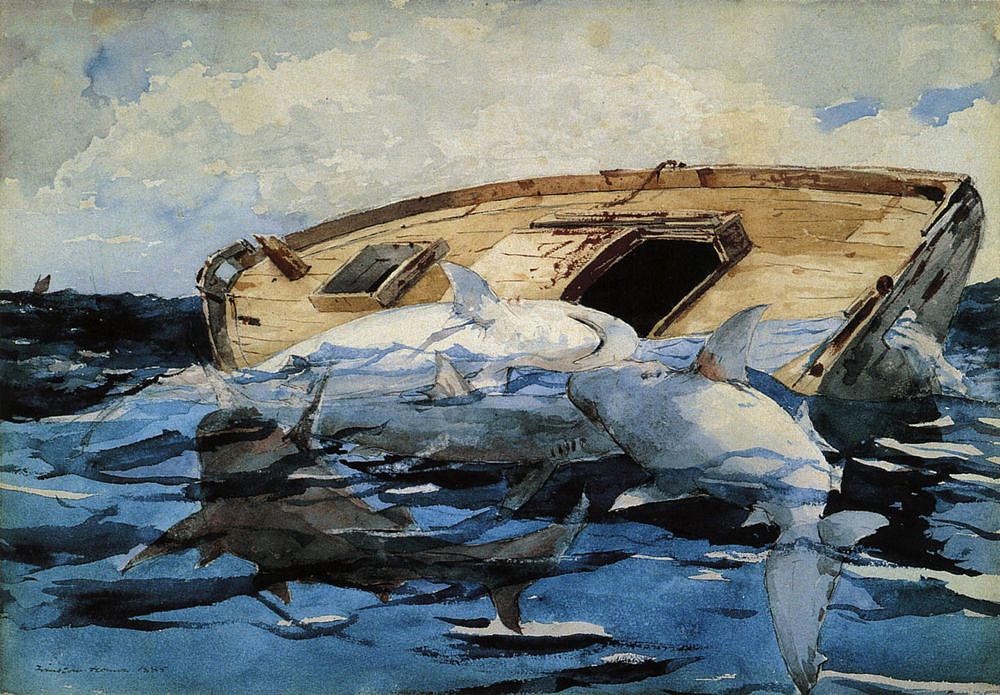
Winslow Homer: Sharks; also The Derelict (1885)
"I can please The Muse by finally getting around to cleaning up the last of last season's mess …"
When we replaced five large picture windows last Fall, we created Detritus. We leaned the old glass up against the fence at the back of the formal rose garden, almost out of sight and definitely out of mind. I'd asked our carpenter's wife and business partner if she knew how to advertise the panes on Facebook or somewhere and she said that she'd take care of it. Sure enough, a week or so later, she texted me to report that she'd found an interested party. I'd not seen her text until a couple of days after she'd sent it and the deal never closed. Winter passed with that glass placidly leaning, bothering nobody. Imagine my surprise when I received a message yesterday afternoon that just said, "Almost to town. Where can we meet up about the glass?" Athena send a follow-up text a few minutes later reporting that the glass guy was finally coming to collect his prize. This news delighted me because the glass had become one of the few remaining bits of Detritus from The Great Refurbish, which we'd almost finished two months ago.
I'm still learning that trying to accomplish anything produces encumbrances to further forward progress, also known as Detritus.
Dolt-Drums
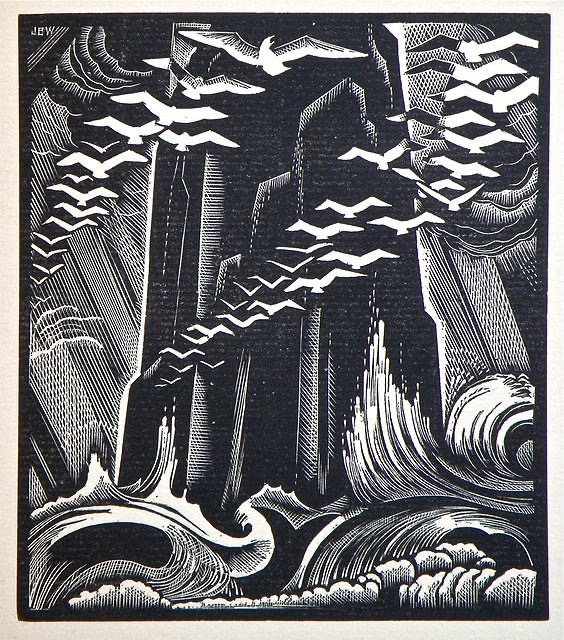
John Buckland Wright: Title Unknown (date unknown)
" … willing to tolerate anything to end up somewhere else."
A point comes, usually somewhere in the middle more than near the beginning or end, where I lose my way. Whatever forward momentum my original bright idea imparted has, by then, largely dissipated. The objective's attraction, however initially strange or alluring, loses its magnetism and I feel adrift amid considerable flotsam: the odd oar, a life jacket, a leaky ice chest, and an almost refinished manuscript. I've forgotten what I was supposed to be up to. I've lost the vision. Once steady trade winds betray me and my rigging slaps impotently against mast and spar, luffing. So recently filled with inspiration, I feel struck stupid. I lose my course and my purpose. What the ancient mariner referred to as the doldrums, the horse latitude stall, I might just as well call the Dolt-Drums. I'm struck by just how dumb I seem.
What was I thinking? What was I feeling? What, again, did I firmly believe I was pursuing?
ChangingVenue
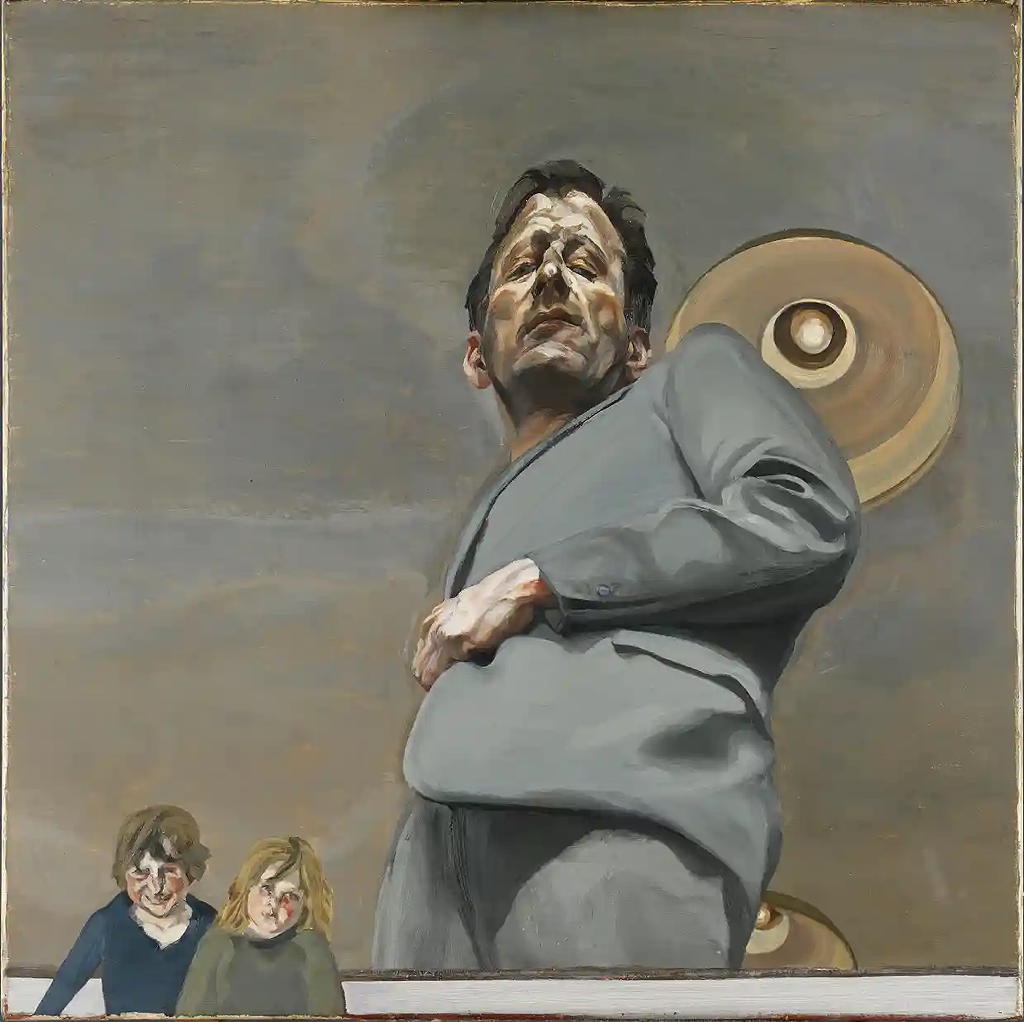
Lucian Freud: Reflection with Two Children [Self-portrait] (1965)
" … my perspective suddenly vaster"
This Damned Pandemic has severely limited my mobility. As a writer, I treasure the movability of my craft. I can just as easily write in the backyard gazebo as at my desk. For years, my desk served as the last place where I'd consider tucking into any actual work. Since the shutdown started two years ago, though, my desk has served as, well, my desk. The view overlooking the center of the universe, where we moved my desk eleven months ago, and The Grand Refurbish, finished two short months ago, improved my location if not my variety, for before the sequestering, I maintained a hot half dozen regular alternative places to work. I could just drop in either of a couple of Starbucks or a local coffee shop near the university, or even another up in our mountain village. I could choose from two fine libraries or a breakfast place with outside seating on Main Street. If I felt constrained at home, I could just head out to find some properly bounded isolation my writing seemed to thrive upon. No longer.
With the COVID and her variants, I hardly ever leave the house, let alone go sit in any of my used-to-be usual public places.
Enhollowing

Theo van Doesburg: Neo-Plasticism: Composition VII [The Three Graces] (1917)
" … my bane as well as my refuge."
My daily Authoring essays have become something of status updates, a widely-abused and misunderstood art form. Back when I managed projects, I thrived or suffocated on the quality of my status reports, so much so that I might have spent the bulk of my time strolling around, visiting with project community members, gathering their impressions of where we were, where our project might be located in space and time. These were Blind Men and the Elephant excursions where each witness testified to often wildly different perspectives. One might be way ahead of where the schedule predicted where they'd be while others reported falling further behind. My job was seemingly to cobble together all these divergent perspectives to report where the effort really sat. These reports were, as a rule, works of fiction intended to keep the sponsoring and managing authorities out of the project's underpants so that we might continue working. Too much of a scent of trouble might incite an inquisition, a review featuring Fundamentally Unanswerable Questions and project managers like me, chartered to provide reassuring answers. Few events were ever more disruptive than helpful inquisitions.
Senior management would issue their own reassurances following the review so that things might return to their smooth-appearing operation again.
Inging

Flag of Qing dynasty or Manchu dynasty
"It might be that I'll be no different after."
What am I doing? Sitting. Breathing. Thinking. Being. Authoring. Inging. Not just any one of these activities, some of which actually involve movement, but simultaneously all of them. What am I, then? Sitter? Breather? Thinker? Be-er? Author? Ing-er? It seems that I'm most likely an Ing-er. I -ing, and therefore I am. Whatever I'm doing, I'm Inging. Right now, I am writing, but not just writing. At what point did I earn my creds as a writer? I know for certain that under no circumstances will I ever only write, for I must also sit, breath, think, be, author, while also Ing on several concurrent levels. Maybe I'm a perpetual part-timer.
I ask these silly seeming questions because they don't necessarily seem all that silly to me.
StalkingDream
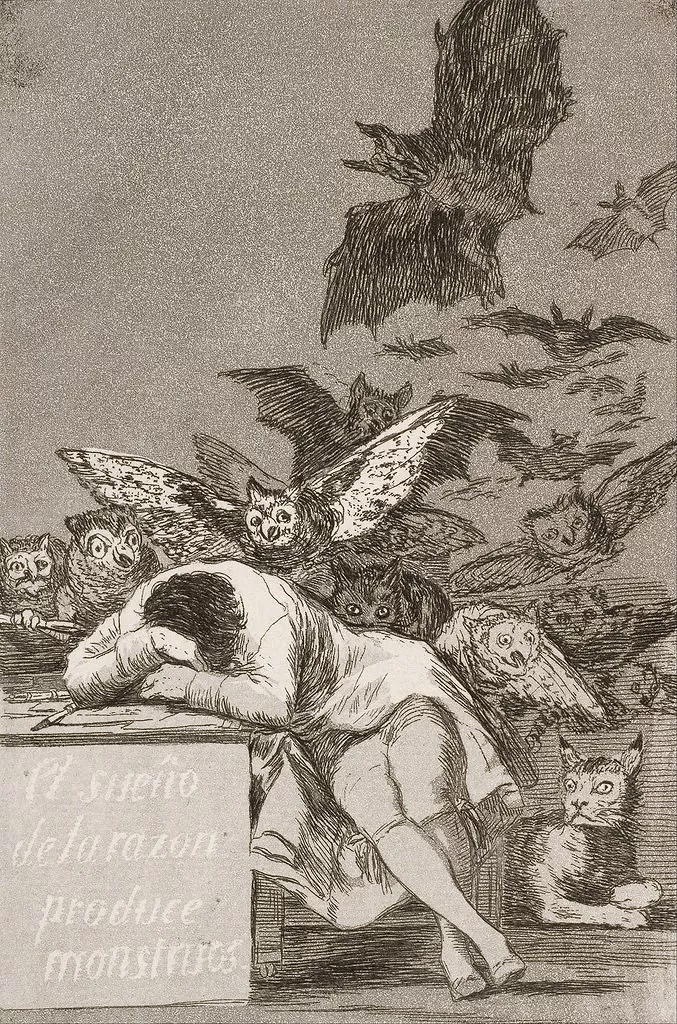
Francisco de Goya: The Sleep of Reason Produces Monsters,
No. 43 from Los Caprichos [The Caprices] (1796-17980)
"Authors of their own meanings …"
My friend Lynn Kincanon writes at least a poem every day. She writes good ones, too, ones not too full of flowery allusion and not so superficial that they don't inspire. I think of her as an every day poet, profound and subtle, accessible and good, often great. She was one year named the poet laureate of Loveland, Colorado, and enjoys a decent Facebook following. Go friend her there. You'll never regret that you did. I introduce you to each other—Lynn, PureSchmaltz member, PureSchmaltz member, Lynn—because today's Authoring story was inspired by something Lynn wrote in the last week or so. She spoke of StalkingDreams, of dreams that seem to come to her on the installment plan, visiting in odd succession, refusing to resolve. They might become close friends, familiar as family, however otherwise unsettling they might remain. It's as if these dreams were movies from an only almost parallel universe, just a touch orthogonal but almost plumb. They're damned persistent, consistently presenting key metaphors and allegories as if insisting that we come to understand their deepest meaning, as if their story really mattered.
I've hosted just such a dream for innumerable sessions over recent seasons, not just a few nights running, but months and quarters.
TheNarrative
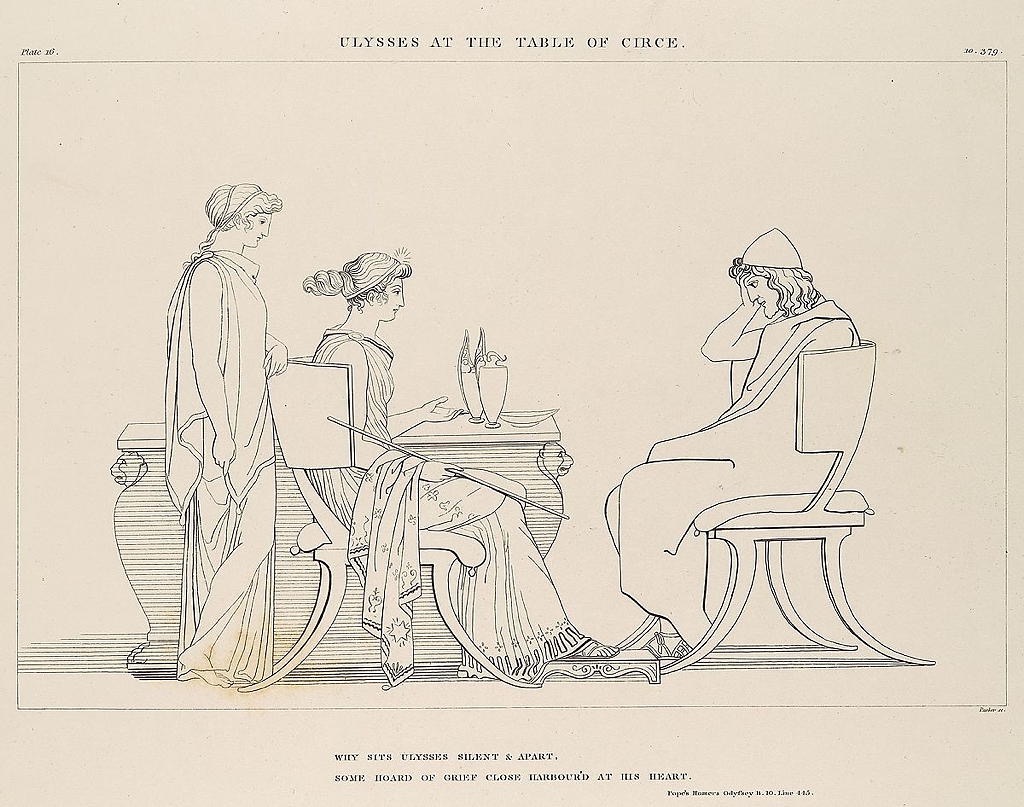
After John Flaxman: Ulysses at the Table of Circe
[The Odyssey of Homer] (1805)
"Discovering it's a dance."
For most of history, people believed that an actual Homer, author of The Odyssey, existed. In the nineteen twenties, a young anthropologist made a shocking declaration. He claimed to have determined that Homer was most probably a role and not an actual individual historical figure. He based his assertion on observation. He visited Macedonia and listened to traditional tavern singers, who specialized in singing lengthy epic poems, often hours long. He learned that these singers could repeat these poems verbatim, night after night, with virtually no variation, a seemingly inhuman capability, yet each such singer managed it, even when in his cups. This narrative first received much push-back from the field, but over time, the simple logic of the story seemed to supplant the centuries of alternative explanation. It was eventually much easier to believe that generations of storytellers developed and preserved these stories over eons rather than that a single individual lived and chronicled them in a single generation. The story about the story changed.
A fair part of Authoring has nothing to do with the physical manuscript, the apparent story in question, but the story about that story.
GoodAdvice
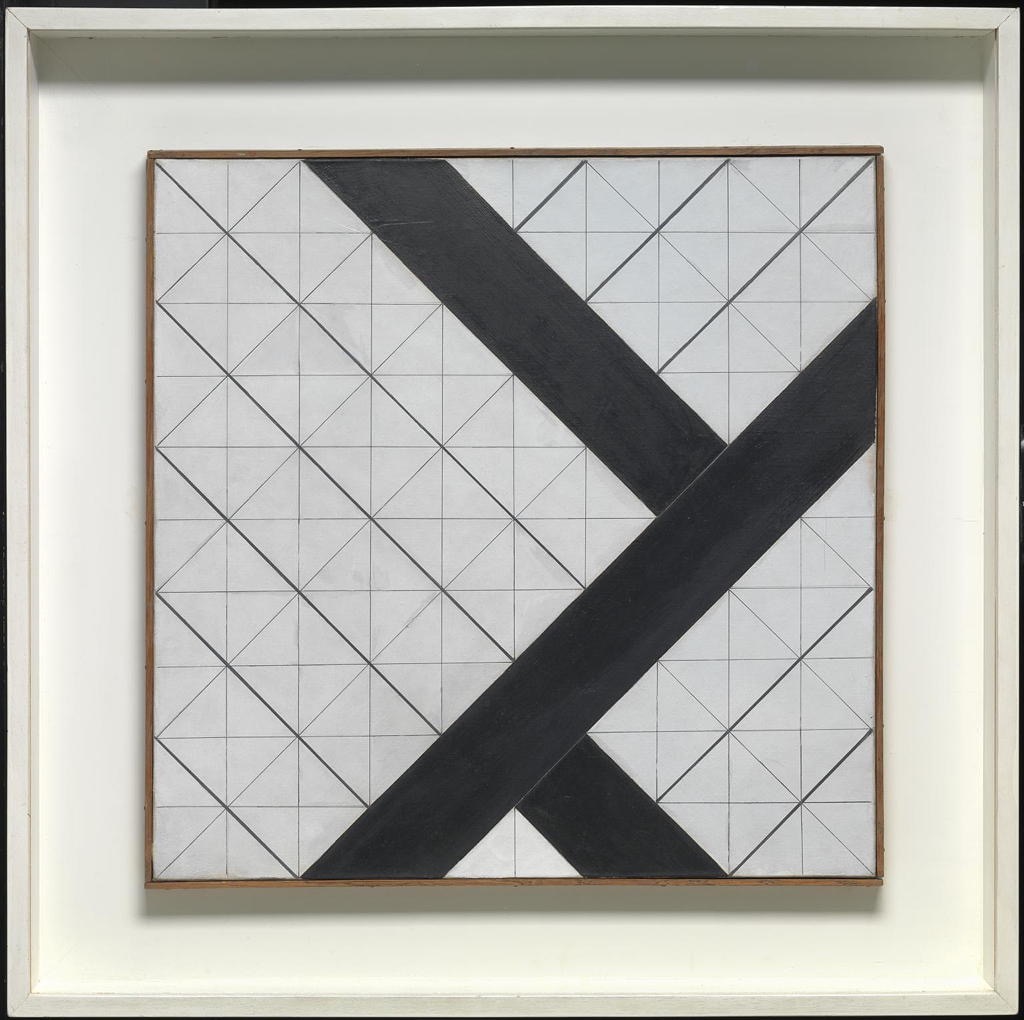
Theo van Doesburg: Counter-Composition VI (1925)
"I might ask if another wants the benefit of my experience."
The best advice I ever received arrived just after my friend WayneeBoy asked me if I wanted some advice. He had not begged the question, either. He made an honest offer. If I had not nodded my approval, he would have held his advice to himself, none the poorer, for his advice came on multiple levels. The first bit he communicated by observing an uncommon courtesy, similar to that extended whenever a visiting sailor seeks to board another's vessel. "Permission to come aboard, sir?" Boarding a ship without first asking permission could cause an international incident, so by long tradition, permission gets asked and extended, a small courtesy which somehow seems to sanctify the visit. We, as in you and me and almost everybody, commonly neglect to ask permission to dispense our GoodAdvice before dishing it out. We often sow our seeds without first preparing the soil, without first considering whether the one so obviously needing our GoodAdvice might be in any position to hear, let alone act upon it. We tend, then, to waste an awful lot of effort.
I know that it seems, in that pregnant moment, that I might be able to help another avoid an error or perhaps recover more easily, if only, if only. If only, indeed!
Slideways
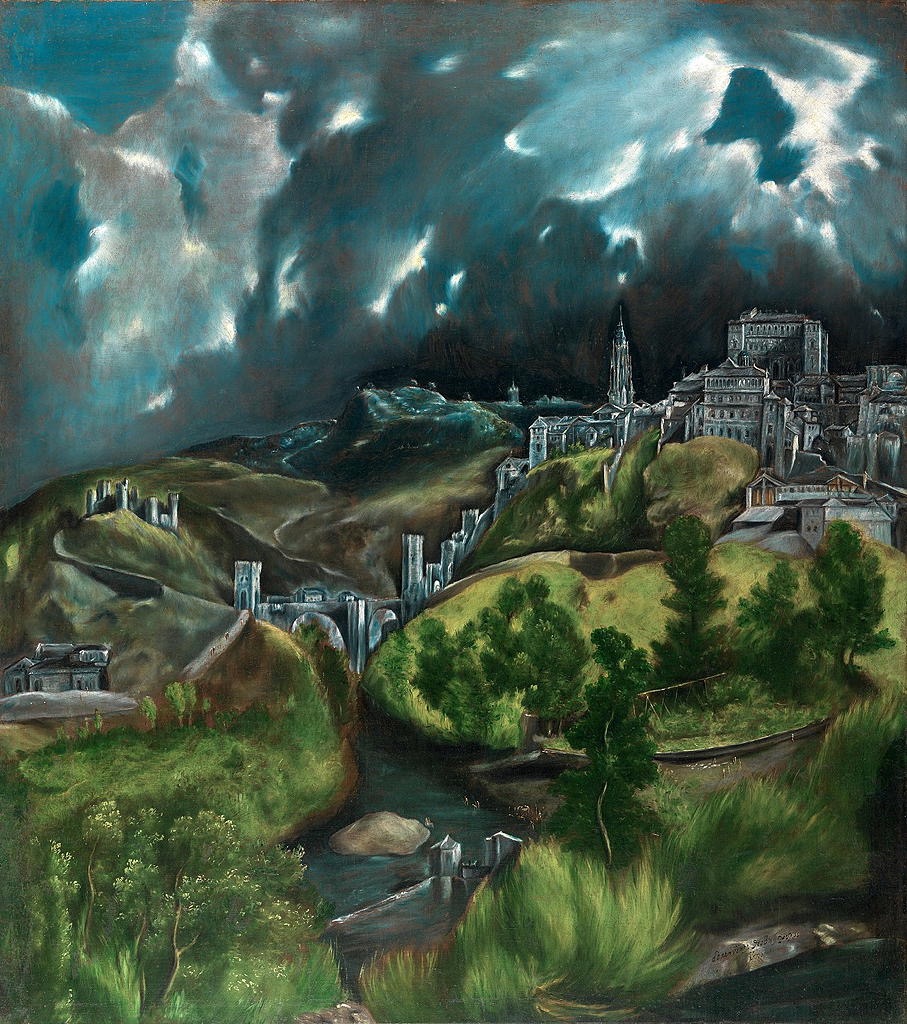
El Greco, View of Toledo, c. 1596–1600
"I'm sliding Slideways …"
How might I describe my writing? Probably not in the same fashion that I usually write, for a description seems of a different order than an observation or worse, an inference. It seems one thing to state that the quick brown fox jumps over the lazy dog and quite another to explain why. The explanation seems necessary because who could possibly conclude the intention without some sideways explanation, one posed at a slightly higher and sideways orientation, perhaps looking down upon the commotion? I'd say that no one's very likely to jump to an accurate interpretation without some outside orientation, without the author of the expression disclosing his intentions, whether those seem at all transparent or even present in his silly sentence. Explaining that the sentence in question serves as an English-language pangram—a sentence that contains all of the letters of the English alphabet—the deeper meaning comes clear. The sentence still seems queer, but more understandably so.
I face the same challenge but on a much broader scale.
AnSight
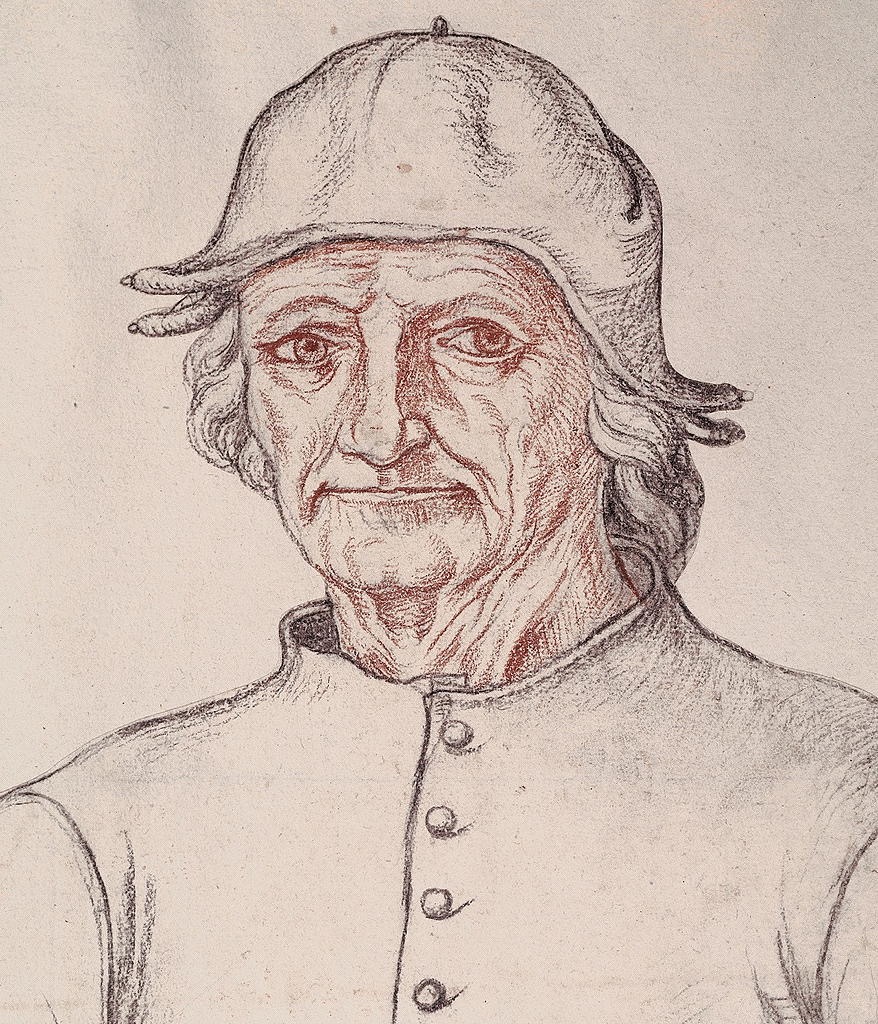
Attributed to Jacques Le Boucq: Posthumous Portrait of Hieronymus Bosch (1550)
"The Purpose of Mathematical Programming Is Insight, Not Numbers"
Arthur M. Geoffrion
"Authoring might at essence be nothing more than discovering how to usefully think about Authoring …"
I suspect that the often frantic search for answers amounts to little more than a typical stupid human trick, one of those traps into which we as a species seem to too easily stumble. When a question stumps me, I usually seek an answer to that question, when answer rarely serves as an initial stage of resolution. An answer tends to be something more like the final stage resolution, the end of attempts to resolve, not the go-to first step, yet we persist in first seeking answers. What might we seek instead? Experience alone might have long ago suggested that we'd be much better off seeking insights instead of answers, for, like management professor Arthur M. Geoffrion proposed in his 1976 essay of the same name, The Purpose of Mathematical Programming is Insight, Not Answers. Likewise, the first purpose of resolving questions might well be to somehow stumble upon some useful insight rather than to expect to somehow cobble together some resolving answer from the outset. An insight might lead to resolution while a search for a resolving answer most often produces little more than a frustrating stymie.
As with many things, the long way seems to be the shortcut when attempting to resolve some burning question.
Doubting
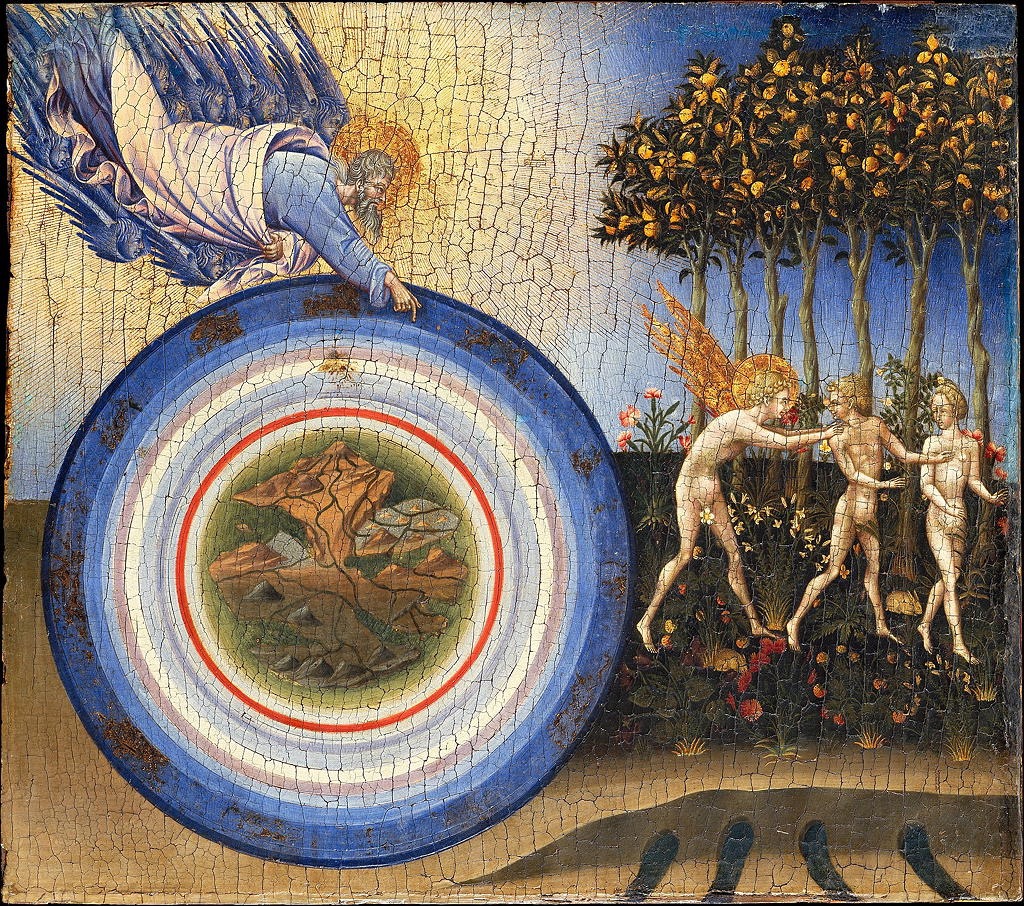
The Creation and the Expulsion from the Paradise: Giovanni di Paolo [Giovanni di Paolo di Grazia] (ca. 1438–44)
"I'm gonna take a couple of pills and call myself in the morning."
Following several focused weeks of compiling and Proofing manuscripts, a point came where Doubting kicked in. My Authoring effort, a faith-based initiative if ever one existed, finds its faith sorely tested as its nose slips past the skepticism point on the spectrum to slide into definite Doubting range. Doubting seems a touch deeper than skepticism. While the skeptic holds a possibility, those Doubting carry a conviction which can only be turned by some disconfirming personal experience. Remember the Doubting Apostle Thomas, who refused to believe in the resurrection until he could personally touch Jesus' wounds? The very presence of Jesus might have convinced any skeptic. So much for the often touted benefit of Doubting. Doubting seems more of a hanging judge type of curse than a blessing.
And I would this morning hang the whole Authoring effort from the highest yardarm, if only we had yardarms anymore.
SecondGuessing
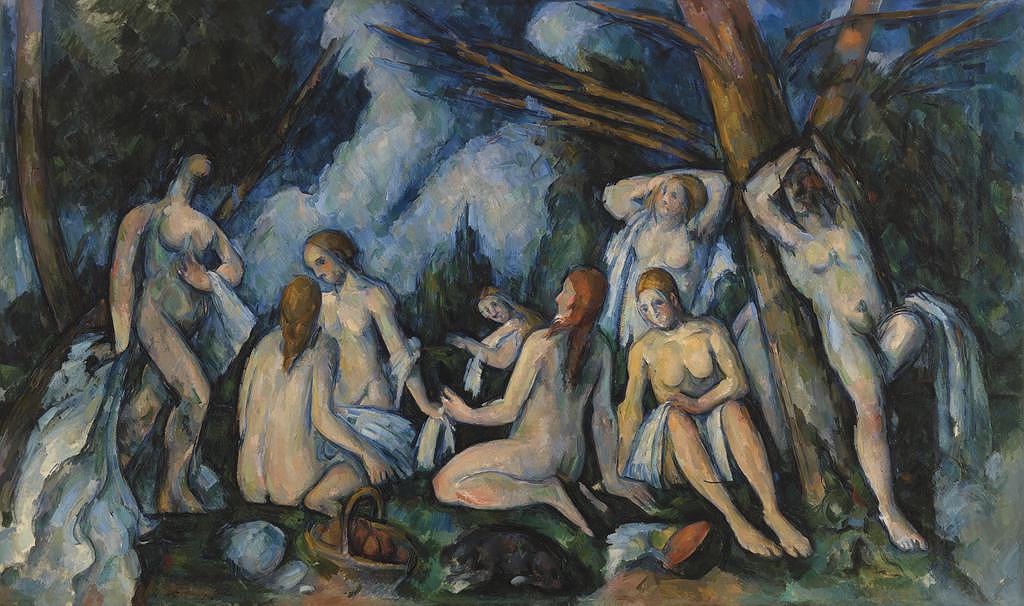
Paul Cézanne: The Large Bathers [Les grandes baigneuses] (c. 1894–1906)
"I'll feel grateful for any future acceptance and unsurprised by any upcoming rejections …"
Rather than reassuring myself, Proofing my manuscripts encourages me into SecondGuessing what I thought I was accomplishing when I wrote them. I try to read each cleanly, as if I was just any old reader, but I know my voice too well to avoid jumping ahead. I also know my thinking too well to enter or exit very innocently. I might not remember precisely what I said, but I well understand how I tend to say stuff, and my logic sometimes seems entirely too predictable and precious. I sense the next glibness coming and almost cringe watching it arrive. I've seen my stand-up routine too often to find my jokes funny or insightful anymore.
I wonder what utility my Proofing brings, but I already know the answer.
Circuitous
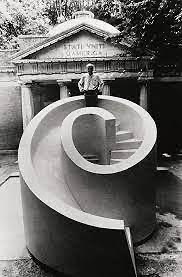
Isamu Noguchi: Slide Mantra (1986)
" … one dare not ever engage in that kind of work anymore."
In this culture, we possess highly evolved methods for streamlining, for 'making efficient.' These tactics underpin what we refer to as Process Improvement, presuming that one improves processes by trimming them down to bare minimums. We prefer methods requiring less time, fewer resources, smaller investments. We're all in for quick and easy, and even feel uneasy when something doesn't seem quick or easy enough, for it seems broken then and in need of 'improvement.' Some activities, however, do not. by their nature, lend themselves to such streamlining. I wrestle with these jobs because efficiency mantras reverberate in my head when I engage in them, telling me that something's wrong, a false positive warning when working with Circuitous processes like Authoring.
I have not yet found the straight or the narrow paths through my Authoring effort.
Enantiodromia
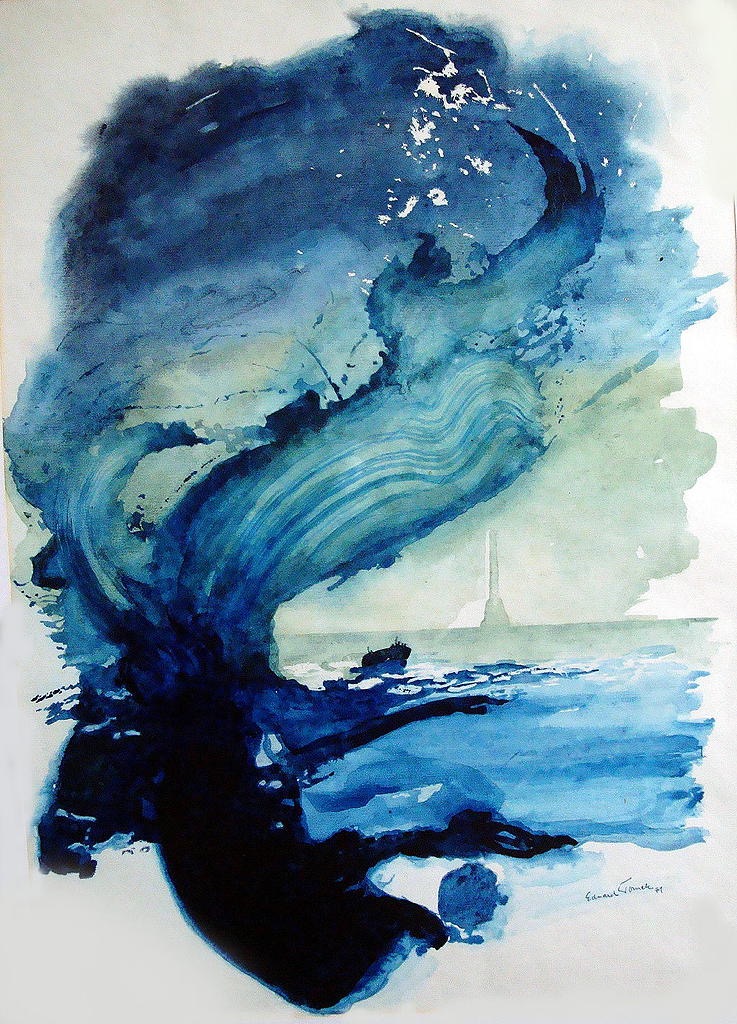
Eduard Tomek: Sea (1971)
"The ancients understood what we forgot."
I don't usually write about whatever we talk about during my weekly Friday PureSchmaltz Zoom Chat. Like all dialogues, one simply must be present in the room, immersed within the context, for the content to make any sense, and attempts to explain what happened to anyone absent from the primary experience seems simply doomed from the outset. Think inarticulate explanation of a movie plot, but I heard myself say something in the thick of yesterday's chat that I think might prove noteworthy, and even germane to my Authoring initiative. I heard myself say that every project ultimately turns into something other than its originating intention before it can be completed. I'd never heard myself (or anyone) state this obvious truth before. Instead, I, like everyone, I suppose, has hung onto the notion that the originating objective accurately represents a project's real purpose, that guiding the effort through to achieve that originating purpose amounted to state-of-the-art 'project management,' when experience might have convinced anyone otherwise. Certainly, many projects have been characterized as failures because they produced something other than their originally expected results, but it might prove useful to wonder if any project of any real complexity had ever succeeded under that strict metric. I doubt it.
The standard practice to counteract this perhaps common phenomena— that projects produce something other than originally intended—has been the final stage politicking typical to every effort of any size, wherein original intentions get reframed to fit within the size shoes the elves managed to produce this time.
AnEmbarrassment

Artemisia Gentileschi - Mary Magdalene in Ecstasy (1620s)
"Everything I hold dear will have become as a rusty spoon, leaving little of substance …"
By the time I finish compiling and Proofing my eighteen finished PureSchmaltz Stories manuscripts, I calculate that I'll have accumulated something like six thousand double-sided double-spaced pages, or six reams of printed material. That does not count the two or three or four other odd uncollated manuscripts I have hanging around even further backstage. It also doesn't count the material I continue producing each morning which, by the end of each quarter, adds another three hundred plus pages and yet another "finished" manuscript. Believe me, please, I am not bragging here, but sitting on the edge of a kind of ecstatic despair. Over the forty-five days since I started this Authoring effort, I've compiled five manuscripts and Proofed three, leaving two compiled but not yet proofed and six more to compile and Proof to resolve my current backlog. Try as I might, I cannot seem to proof more than one manuscript per week, for I find that work rather like reading poetry. One cannot speed-read poetry. Proofing my prose induces bouts of ecstatic despair, for the slowly shrinking pile of paper seems an authentic source of both pride and embarrassment for me, one of incalculable wealth.
I had not intended to do this to myself.
Honing

Massimiliano Soldani: The Knife Grinder (c.1700), Albertinum, Dresden
" … sharpening a skill."
Many mysteries have been resolving themselves as I continue my Authoring efforts. I've gotten to the point where I feel as though I can almost make my compiling software do my bidding, though I declare this while keeping the fingers of my right hand crossed and secreted behind my back. No use tempting fate. I feel about as proficient as a novice driver who only drops one in three shifts; more skilled but hardly a master yet. Let's say I'm getting by, and as I begin to get by, my collating effort seems less insurmountable; still at root impossible, but now, surprisingly, less so; a smaller infinity. And with this improvement, the grey cloud which had taken up residence just over my head has begun dispersing, like the fog bank hiding horizons here since Christmas. It's not Spring yet, but the brutal part of the Winter's finished. I sense the brutal part of my Authoring's behind me, too, but behind me like my right hand's behind me, with crossed fingers. Let's say that I've been Honing my craft.
Honing seems an interesting activity because it sits in the often neglected middle ground beyond beginning but before ending.
RipVanSchmaltz
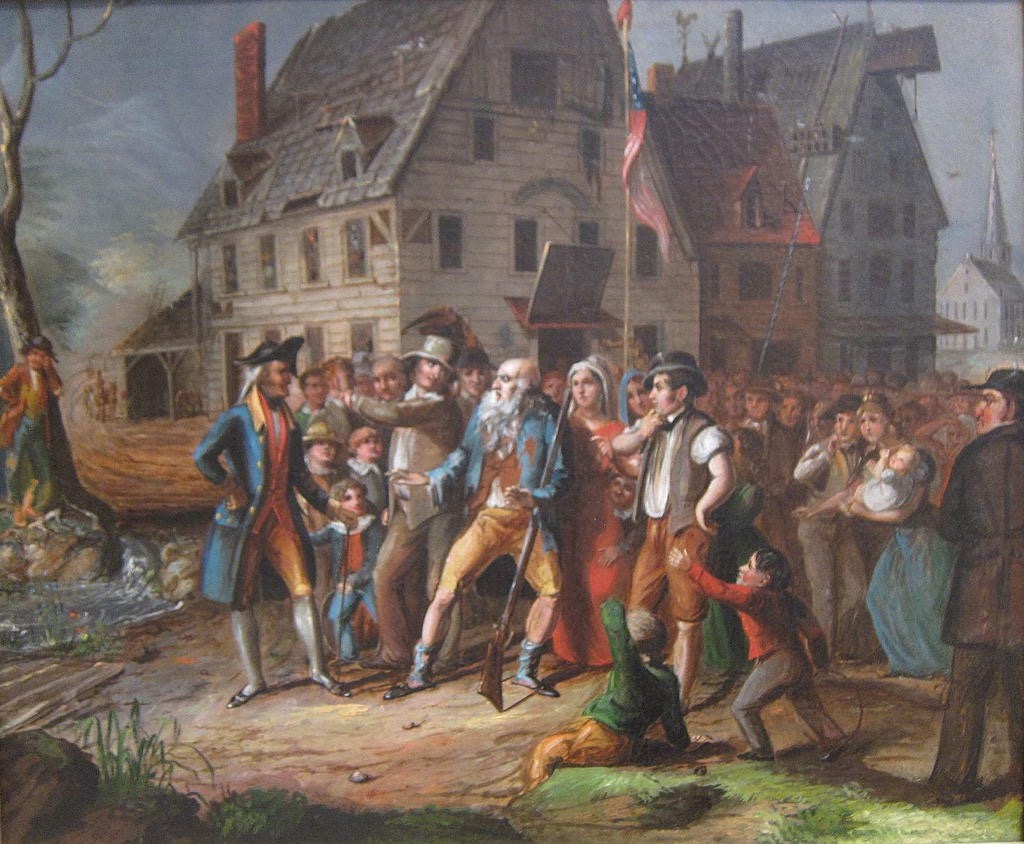
Albertis del Orient Browere: Rip Van Winkle (1833)
"What an overlong and awfully strange nap it's been."
Washington Irving's Rip Van Winkle slept for twenty-five years, at least a third of a lifetime, to awaken into an unrecognizable world where children had become adults and adults, elderly or dead. He, himself, had grown a long white beard and moved with unaccustomed difficulty. I can speak anecdotally, from my own experience, to report that one need not doze for twenty-five years to experience a Rip Van Winkle effect. I'm convinced that no wakefulness exists that's powerful enough to stave off this result, for this world seems in constant flux and moves indifferent to us. Focusing upon any piece of it will leave one out of synch with other parts, and there exists altogether too many parts for any one of us to ever even hope to keep up with their fluxes. The Muse and I went on a thirteen year exile only to return to a place essentially unrecognizable, then we set about refurbishing, which further erased many formerly reliable context markers. We returned to a place we'd never before inhabited to carry on a life that had been more than merely disrupted.
The first few years of our exile, we were able to easily maintain the dream, by which I guess I mean that we were already sleeping.
SpurtyWork

Artemisia Gentileschi:
Self-Portrait as the Allegory of Painting (1638–39)
"I hope to stumble upon some insight …"
I might classify work as belonging to two general classes: steady work and SpurtyWork. Our hunter-gatherer ancestors avoided steady work, but in more modern times it has become the dominant form, usually dispatched in shifts, often extending over many contiguous hours, days, weeks, months, years, and careers. SpurtyWork exclusively occurs in bursts, often separated by lengthy idle or distracted periods, time spent away from focusing upon the effort. Steady workers and SpurtyWorkers have always held contentious, often contemptuous opinions of each other. To the dedicated steady worker, SpurtyWorkers seem frivolous and lacking in any primary focus. To SpurtyWorkers, the steady workers seem like wage slaves, masochistically mortgaging their lives to the unforgiving time clock and unrelenting seasons. Steady workers might reasonably aspire to efficient performances that could not possibly even compute when considered from within a SpurtyWork context. Steady workers might experience flow. SpurtyWorkers produce in fits, starts, and stalls, with apparently heavy focus upon stalling, idling. Farmers traditionally complained about hunter-gatherers' lax habits, thinking them lazy, though a hunter-gather could typically satisfy their needs working many fewer hours and so adopted lifestyles dominated by leisure rather than labor. Steady workers are Puritans, SpurtyWorkers, Bacchanalian, at least in each others' opinion.
Authoring's inescapably SpurtyWork.
ShelfConfidence
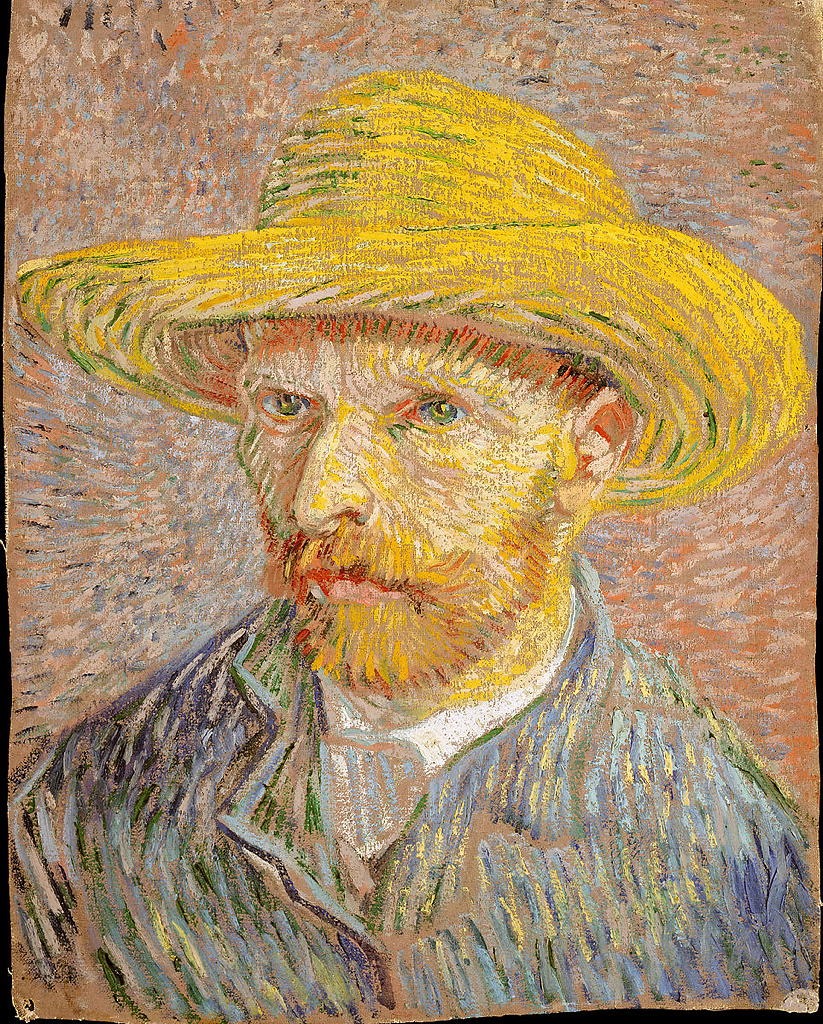
Vincent van Gogh: Self-Portrait with a Straw Hat [obverse: The Potato Peeler] (1887)
"Here I come!"
Writing might be the very most introverted activity ever devised. Authoring, a staging and performing of the writer's product, seems the opposite. As a writer, I've long wondered who I thought I was writing for, with various responses, though I mostly seem to be writing to and for myself, as insular and recursive as that might seem. Authoring's queuing up that internal stuff for more public distribution and consumption, from the perspective of the writer's solipsistic whispering, an audacious act. Posting my pieces began as tiny outrageous acts, duck and cover operations, as if I was chucking each one over a sturdy wall to splat down near unnamed targets. As I attracted an audience, the possibility of becoming an adviser arose, but I've mostly chosen to share the echoing I witness happening within my head. Any advice I might give tends to come obliquely, by example, the transcribed dialogue between me, myself, and I. I lack the self confidence to otherwise promote my internal dialogues. I've mostly just chucked them over walls like unguided missiles, hopeful that they won't do too much damage or spark too awfully many complaints.
Authoring drags that self-effacing operation out of its closet, or seems to threaten to.
DreadLines

Rembrandt van Rijn: Abraham's Sacrifice (1655)
"Some days, I manage to walk through walls."
I deeply dislike the term Deadline when used to denote a point where an assignment's supposed to be completed. It connotes something almost never evident, that the date represents a drop dead point, that somebody will die should that expectation not be satisfied. This is so rarely the case, that Deadline amounts to hyperbole, intended, perhaps, to rile up the more existential instincts. I've seen project teams go insane in the shadow of an impending Deadline, though I've yet to see anybody actually die when the Deadline wasn't met. They're mostly never met. A trumped up threat might serve as the very last thing most project teams seem to need to motivate them to perform.
I've proposed calling them Stay Awake Dates, points of special awareness well short of existential dread.
OtherWorlds
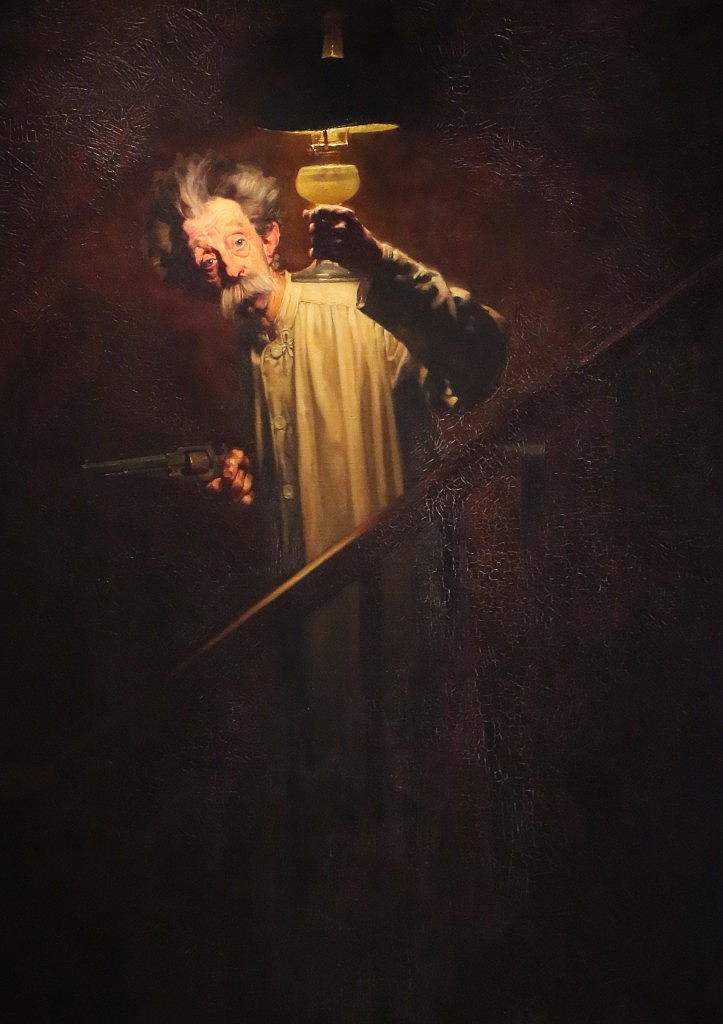
Norman Rockwell: General Electric Promotional Poster
"What a Protection Electric Light Is." (1925)
"We must be blind to enter OtherWorlds …"
Authoring intrudes upon OtherWorlds. Even when producing a work of current affairs, currency quickly slips into the recent past before further immersing itself into even foggier history. Our current world quickly shifts into OtherWorlds, too, its literature—fiction, non-fiction, reference—probably irrelevant for its original intentions. Even our current world, slippery though it might seem, favors certain orders. It wants originality but not unfamiliarity. It wants inventive similarity, not precisely a copy, for that might border on plagiarism or worse, produce a derivative work. It wants an urgency, as if a work should carry a critical message such that receiving it might stave off some catastrophe. It might seek the avant garde but rarely the weird. Beatniks without beards. Hippies with clean hair and pressed jeans. A reassuring future.
Any author seeking sanity should probably consider changing careers or just stop listening to what anyone insists that they want them to produce.
Ambivalence
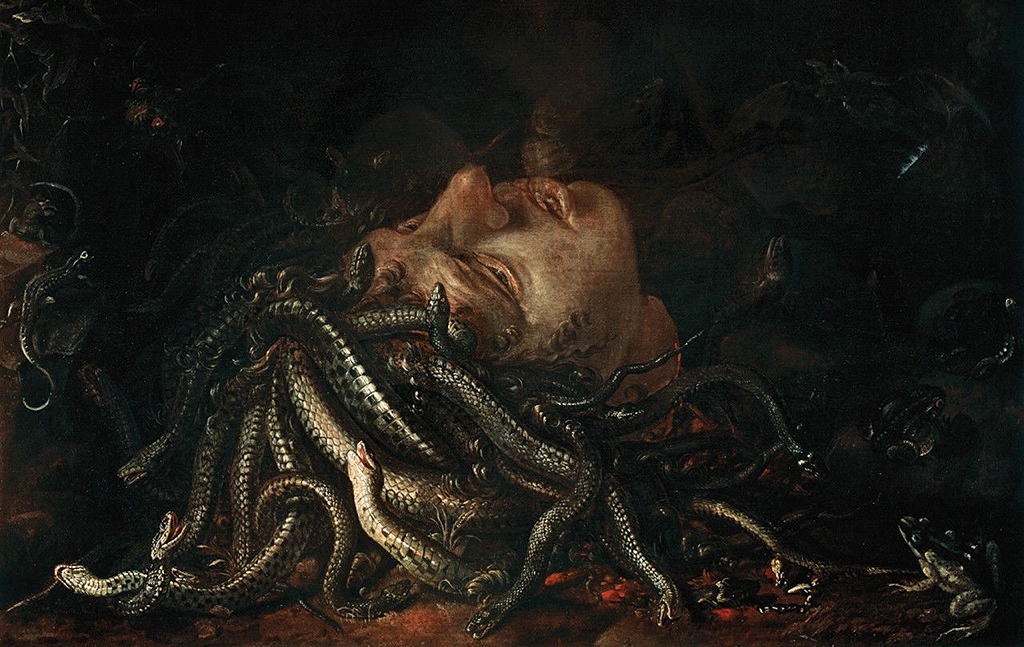
Head of Medusa, originally attributed to Leonardo Da Vinci.
This painting was later believed to have been created by a Flemish painter in the late 16th or early 17th century.
"Authoring seems to want its own pace …"
Nearly forty days into my Authoring effort, I notice a few snakes in my head. I know, like you know, that a genuine Hero's Journey should feature a steadfast and stalwart hero, someone holding unwavering dedication, not someone questioning his charter or purpose, yet this hero has been holding a few questions. I've found through decades of engagements, that at some point—it doesn't really matter if that point comes nearer the beginning, middle, or end—it can prove useful to apply some focused ambivalence upon an imperative effort. Especially if it seemed as if it absolutely has to get finished … or else, that there exists no reasonable alternative to successfully navigating the course, no matter how harrowing, that not succeeding would be tantamount to failure, it's especially important to reconsider again just how essential the effort might have not become. Is the race still worth running? Or else what?
I store this tactic in my Anything But That! drawer, one I only rarely ever open.
TheFortunateFew

Self-portrait of Nicolas Régnier painting a portrait of Vincenzo Giustiniani (1623-24)
" … my steadily eroding naiveté sipping bitter coffee."
As details of my Authoring initiative have come into focus, I realize that these have most often appeared as fresh insults to my originating naiveté, disappointments and difficulties. Some have valiantly attempted to reassure me that I'm probably not as crazy as I seem to feel, given my testimony, and I sincerely appreciate these attempts, for I am probably not as crazy as I sometimes feel. All told, or enough told to find a coherent thread, I remain one of TheFortunateFew. I am pursuing some ends larger than my original footprints. I'm testing edges. I'm making discoveries. I might even be making a difference, though that assessment must wait until I'm through this gauntlet. I believe that any worthwhile initiative must necessarily start as a sincere expression of the protagonist's innocence. His naiveté. However experienced he might have been then, his prior experience will have to become irrelevant in light of what this latest adventure manifests. The process by which naiveté wises up, that's the means by which the worthwhile emerges here. It was never different.
Each discovery which disqualifies some element of the initiating naiveté can seem brutal if not necessarily vicious.
HollowingDays
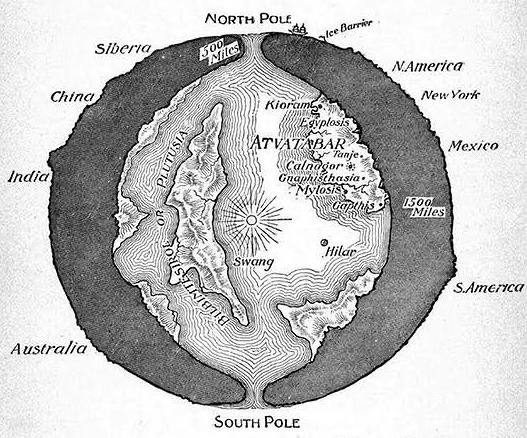
A cross-sectional drawing of the planet Earth
showing the "Interior World" of Atvatabar,
from William R. Bradshaw's 1892 science-fiction novel
The Goddess of Atvatabar
"This, too, should ultimately pass."
Much of what constitutes Authoring amounts to isolated effort. From ideation through writing, collating through editing, everything could occur in solitary confinement, and does, or might just as well. Especially during This Damned Pandemic, alternative activities seem few and ever further between. When even heading out for a haircut gives pause, and should, this author most often chooses to simply anti-socially distance. The cats have come to know me too well, they sense my intentions better than I do myself. I live at their beck and call since I'm always nearby, never gone, but increasingly absent for myself here, too, as January degrades into HollowingDays.
The outside temperature has not varied more than three degrees in weeks, freezing plus or minus two. Chilling.
GrandDelusion
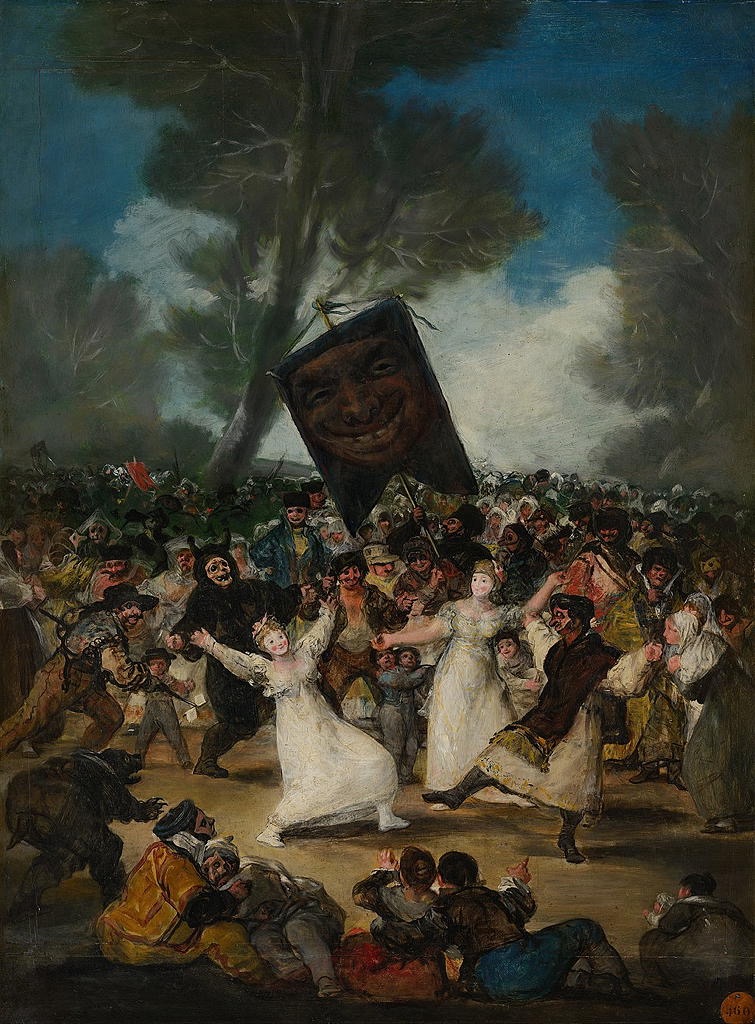
GOYA: Entierro de la Sardina [The Burial of the Sardine] (1812-14)
" … how often they come true."
In my first year of junior high school, I began to get stomach aches. My mom took me to the doctor who concluded that my stomachaches were all in my head, not caused by any physical difficulty, but an emotional one. I was at the time struggling with a French class in which I'd enrolled under the delusion that I might one day be college bound. Enrollment in colleges in those days required two years of foreign language study. I abandoned my GrandDelusion of one day attending college the day I decided to follow my doctor's advice and drop the French class. My stomachaches abandoned me shortly thereafter, but I found myself lacking a GrandDelusion in my life and feeling its absence. You see, I subscribe to the school of thought that believes in the absolute necessity of maintaining a GrandDelusion in one's life. Without one, I'm sunk.
With one, I'm sort of sunk, too, but sunk of a different order.
Cœurage
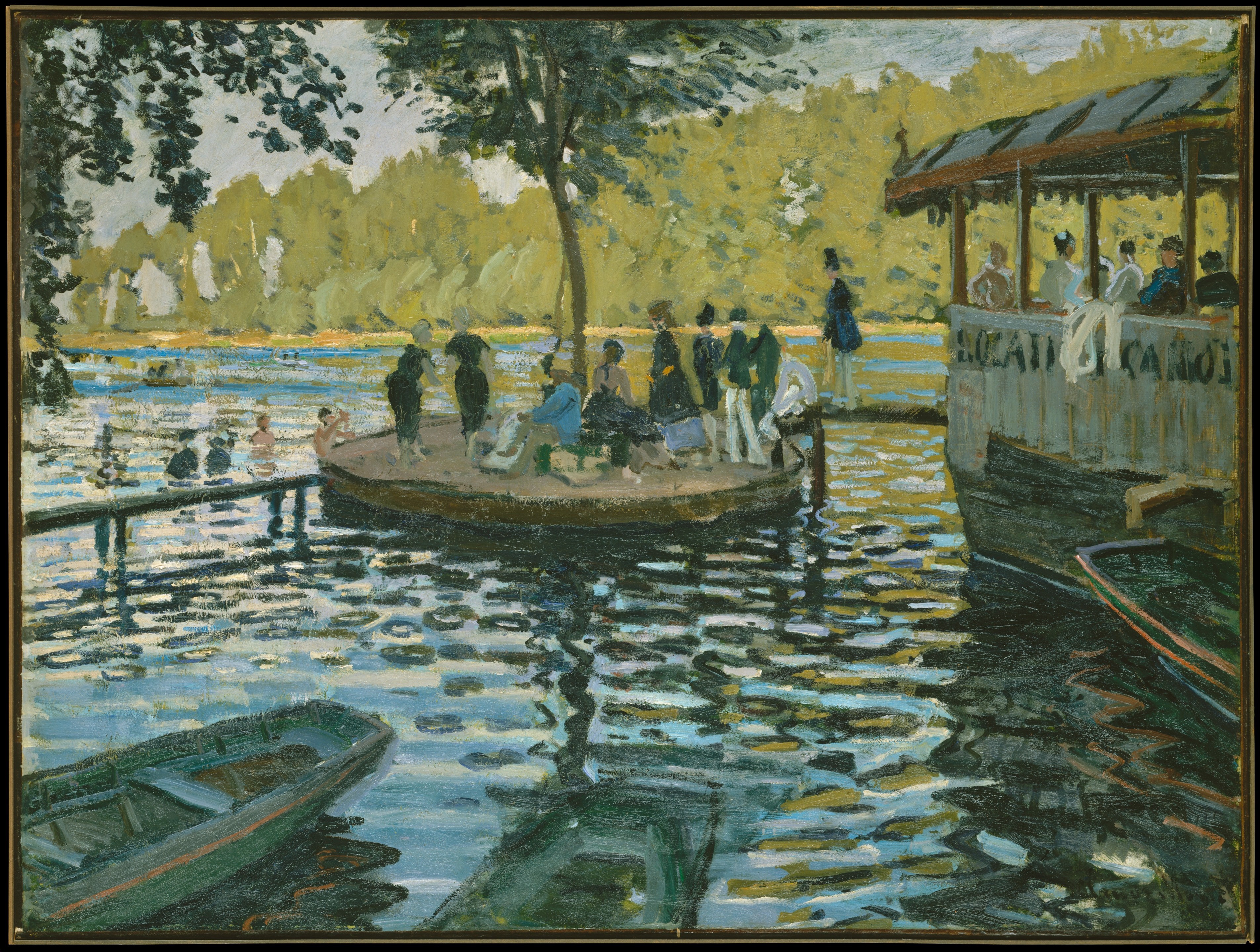
Claude Monet: La Grenouillère (1869)
"We're bred as critics …"
Authoring requires more heart than I can muster some days. Draft manuscripts simply must be reviewed with empathy or they'd all be reduced to red pen scratchouts the first time through. Only a wide open heart can prevent cringe-caused muscle cramps. One simply must, or I simply must, read with a sympathetic eye, which might render me my most worthless editor. My work could not survive without generous initial interpretations. If I wanted to discredit it, I could sink the whole damned enterprise in seconds. I cannot seem to write with a vengeance or author with one, either. I engage with disturbingly transparent skin, as if my spirit suffered from circulation problems. I wear a sweater and thick socks, protecting myself from the often shocking encounter with the real world and her expectations. I must write from my heart and author from there as well. This simply seems fundamental.
I am taken by the root from which courage sprung, the Latin cor (meaning heart) and the French Cœur (also meaning heart.)
TimeOff
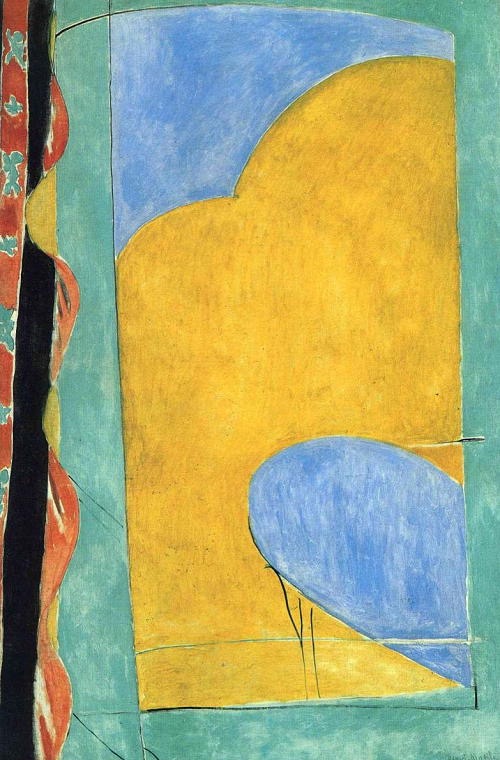
Henri Matisse: Le Rideau Jaune [The Yellow Curtain] (1915)
" … a man scribbling his living."
For me, writing and even Authoring serve as professions which do not come with TimeOff. I work weekends, holidays, even days of holy obligation, for writing and Authoring seem more lifestyle than job. Every morning seems to bring a superior personal obligation for me to engage, however holy or otherwise. If one works as a writer, one works as a writer, always practicing, never finished. Authoring so far seems no different. One does not remove one's writing boots, kick back, and forget the latest engagement. Writing doesn't finish. It's never done. Just as soon as I finish my daily essay, I'm copyediting the thing. I usually read it through about a half dozen times before I'm satisfied that I've caught all the errors I inadvertently imbedded in it, but even then, I'm apt to return again later to find a fresh couple needing correction. It's not uncommon for my Friday review of my week's writing to uncover yet another few lurking shortcomings needing fixing. The writing work's truly never done.
Authoring, too, seems fundamentally insurmountable.
a clean, well-lighted place
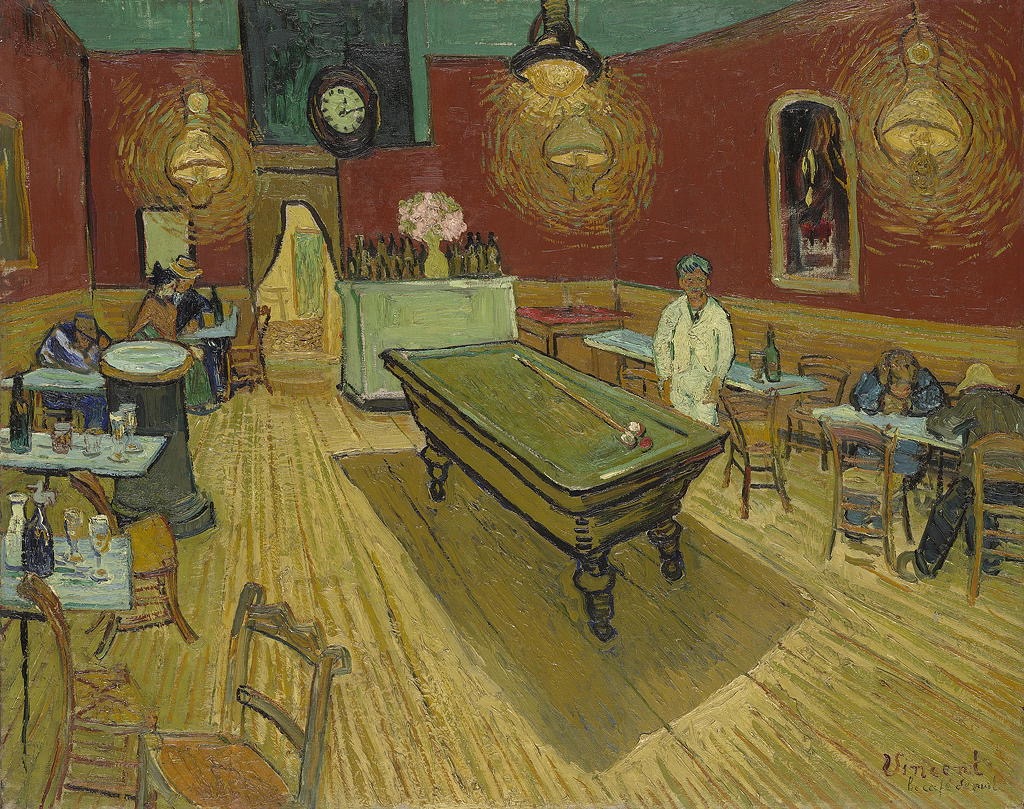
Vincent van Gogh: Le Café de Nuit [The Night Café] (1888)
" … I'm seeking immortality …"
Visiting Portland after a long winter and Damned Pandemic-induced absence feels as refreshing as a visit to Paris or Rome. Compared to our home near the center of the universe, it's a major metropolis. Further, due to the efforts of an inept surveyor, Portland's city blocks are tiny when compared with any other American city's, lending a human-scale aspect to the place. Even further, Portland features those exemplars of civilization, clean, well-lighted places for books. Portland's many bookstores encouraged me to pursue my literary leanings, for the very best future I could imagine featured me on one of those well-organized bookshelves in the old Beaver on Hawthorne or the original Powells, or even A Clean, Well-lighted Place For Books in San Francisco. I imagined myself shelved among masters, the E. B. Whites and James Thurbers, the John O'Haras and Eliot Pauls, and so I eventually was, but rather too near the end of the reign of the great American bookstore.
It's been half a generation now since the bookstore first felt the hand of internet commerce.
InCompetences
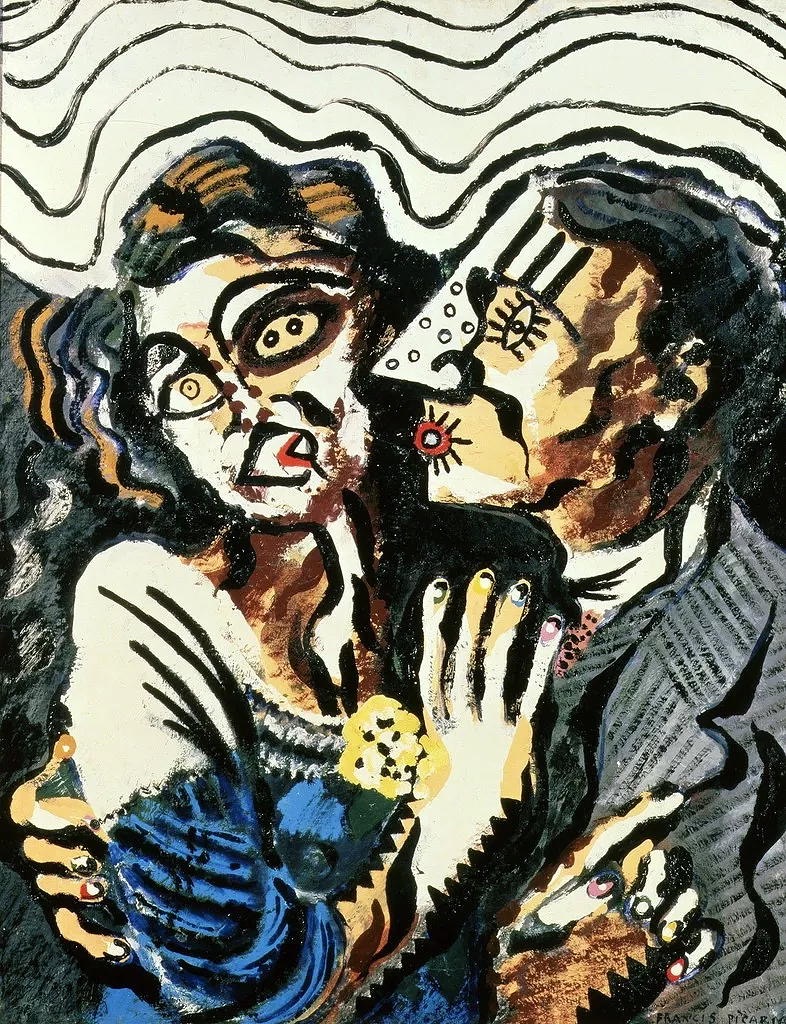
Francis Picabia: Première Recontre [First Meeting] (1925)
"If competence were a defining attribute, this world would have long ago crumbled. "
For me, writing seems an extended experiment intended to answer a simple question. Am I a competent writer? After a half century of experimentation, I've accumulated no conclusive evidence either way. I have seen evidence that I was, at times, at least bordering on competent, like when I learned that my Blind Men and The Elephant had become a bestseller, but that proved to be a lagging indicator, suggesting that I had at one time in the past been competent enough to pen a popular title, but it could neither suggest nor prove whether that gift had persisted into then present times or whether it might extend even beyond present time into any future. My experimentation continues. I each day manage to muster enough foolhardiness or courage to face the blank screen and begin again. Some days, like yesterday, for instance, I managed to feel competent as I wrote, a rare enough occurrence for me to make a note in my lab book. Further, I felt that the result, the surviving essay, proved to be top notch. I impressed myself. Then I went on to the other activities involved in my budding Authoring practice and fell on my face. I'd encountered yet another in my deep inventory of InCompetences.
I do not feel completely incompetent.
Mindlessnessing
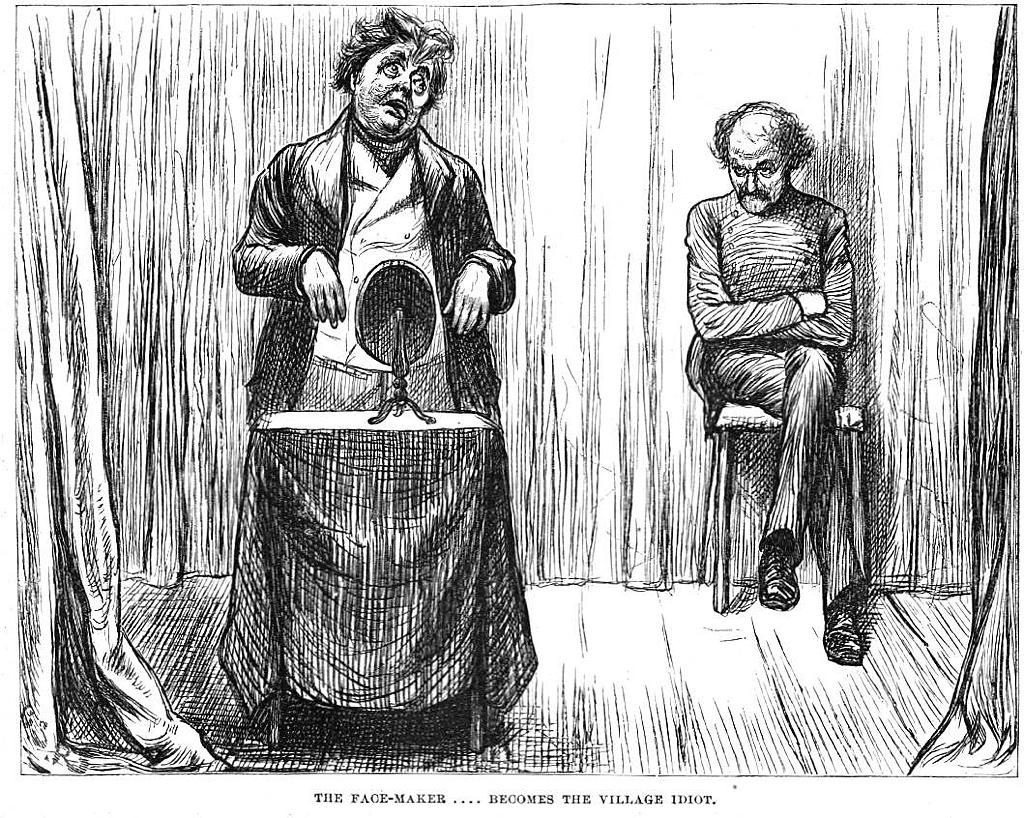
Charles S. Reinhart: The Face-maker . . . becomes the Village Idiot (1876)
"Hardly an ounce of mindfulness required."
Mindfulness has become a topic of popular conversation. People offer training to increase and improve one's mindfulness, and by all reports, that sector of the economy has been booming, this in spite of the contrary trend that most work remains at least ninety percent mindless effort, and growing. I see nobody—absolutely nobody—offering the mindlessness training so sorely needed in this post-industrial economy. The late nineteenth century industrial boom utterly depended upon the efforts of a few committed engineering types who dedicated themselves, their lives, to redesigning manufacturing from the sole purview of skilled artisans into steps so simple and fundamental that a well-behaved village idiot could excel in essentially any trade. The mindfulness necessary to produce virtually every consumer good plummeted between 1850 and 1920, such that mindlessness became the hottest commodity in the overheated job market. Millions of ignorant immigrants, some of your and my forebears among them, were welcomed to our shores and into jobs designed to make the average person stupid and the exceptional, insane. Each successive automation wave, up to and including computers and smart phones, left ever fewer jobs requiring mindfulness and ever more requiring an increasing proportion of Mindlessnessing. And here we are today.
It should not be the surprise it seems, then, for me to discover that even Authoring has become a victim to modernizing Mindlessnessing.
RevisitingPurpose

Guercino: Allegory of Painting and Sculpture (1637)
"I answer another question entirely …"
As I "finish" manuscripts, preparing them for sharing on into the world, I catch myself asking the inevitable question. "Are these works living up to my original intention for creating them?" The answer might prove unimportant for judging their quality as writing or even as literature, but I have not been occupied these past four and a half years just writing or merely producing literature, I have been—or intended myself to have been—fulfilling an original purpose. It might prove to be a fair question to consider whether I seem to have spent my time focused or if I became victim to some distraction. Lord knows I have encountered plenty of distractions.
That I even need to ask myself the question might suggest something about my writing practice.
SecondOrderStorytelling
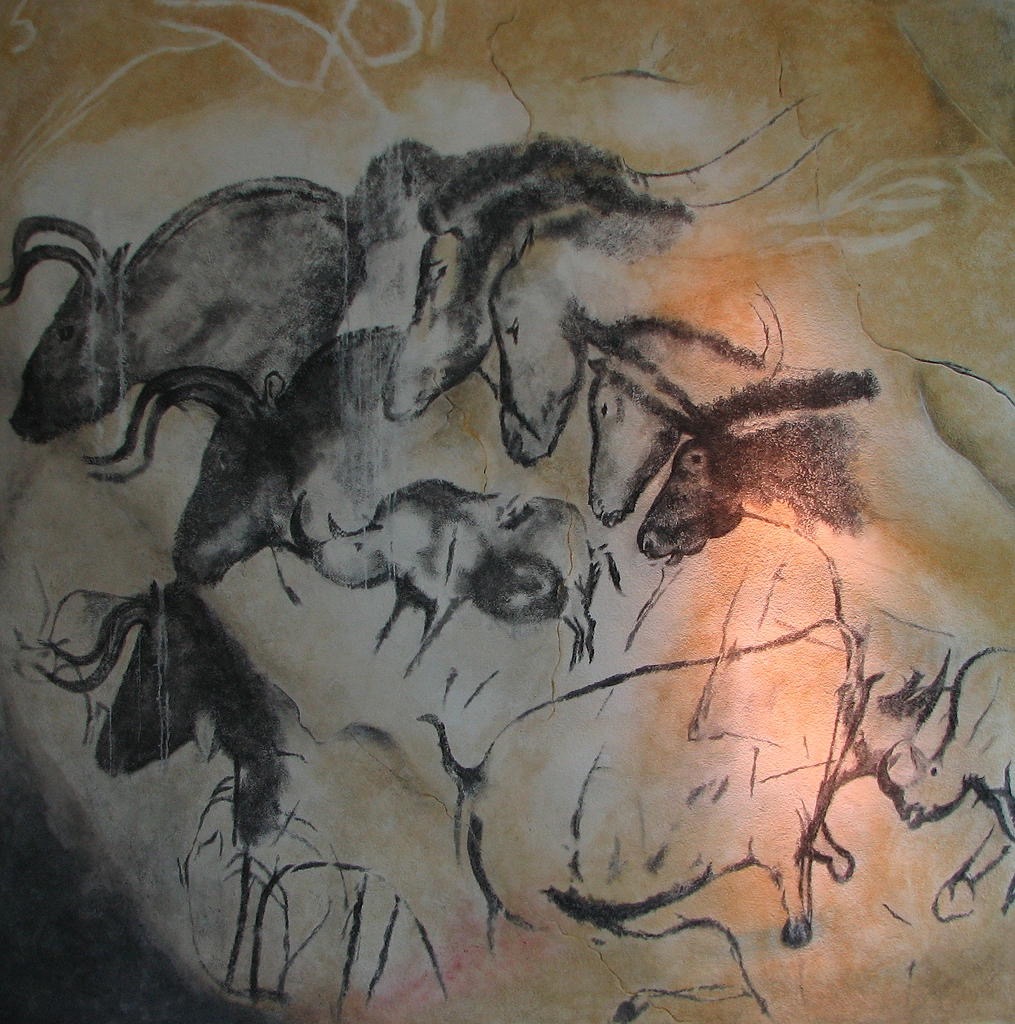
Unknown: Replica of paintings in the Chauvet Cave (Aurignacian Era—32,000 to 30,000 years ago)
"Authoring's also like this."
As I finished reading another draft manuscript, having proofed and corrected it, and for the very first time experienced it as a complete work, I remembered what came next. Now that I'd told the story, I would be called upon to tell the story about the story, to commence with a period of SecondOrderStorytelling. If writing a book's challenging, and, believe me, it is, writing the book about the book proves even more difficult for this humble and often humbled scribbler. I imagine a promoter of the ancient artists who created the work found in France's Chauvet Cave directing those artists to explain their work, pointing out that future generations, to whom the work would inevitably belong, might struggle to understand the purpose and significance of the artwork without a crib sheet interpreting it for them. The artists, skilled in the visual arts, might well have struggled to satisfy this perfectly reasonable request, them not possessing a written language yet and all. The same fate befalls the modern writer aspiring to authorhood, for he, too, feels as though he lacks a written language adequate to explain what he readily admits might prove difficult to sell if he cannot find a way to tell the essence of his story without forcing his potential audience to actually read the manuscript and draw their own conclusions. He's called to explain himself.
I can imagine Melville mumbling that his book's about a whale.
Rhythmia
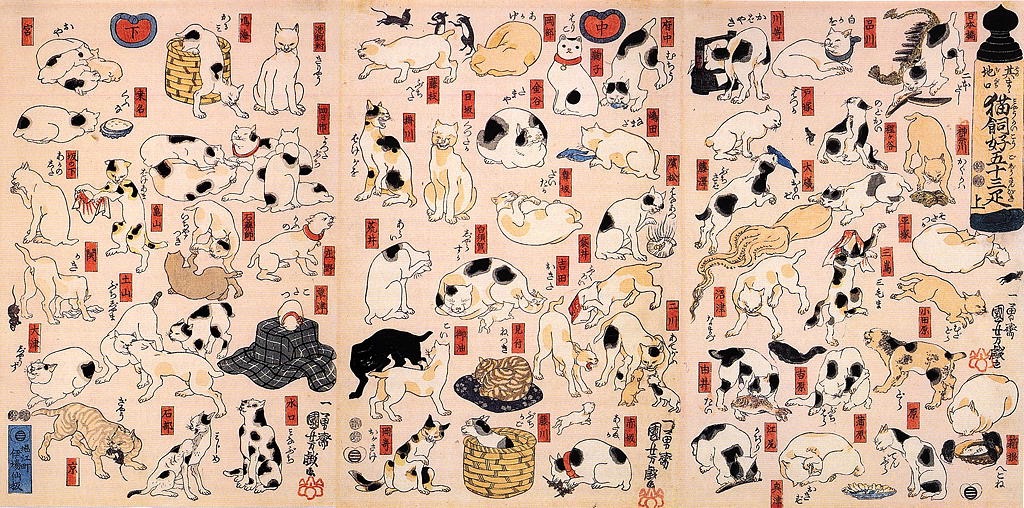
歌川国芳 (Utagawa Kuniyoshi, 1798 - 1861): Cats suggested as The Fifty-three Stations of the Tōkaidō
" … the effort hardly feels like working …"
Each new beginning seems to induce an arrhythmia of sorts, a break in the accustomed cadence and flow. The new pace might be sought, even insisted upon, but the first few clicks will lack some essential, though I'm unlikely to be able to describe what. Something will be missing and my world will feel off kilter. I won't know precisely what's wrong or what to do about the apparent imbalance, other than to simply soldier through it. Then, of course, I'm soldiering rather than performing and even I notice that difference. I get to wondering what happened to my once relatively effortless performance and why every damned thing I touch requires almost superhuman effort. I know, of course, but knowing, if anything, just makes the situation seem worse because if I can diagnose, why can't I resolve? I know I've lost my rhythm, my Rhythmia, but never really knew how I'd found it before. I'm tempted to suggest that I never once before ever found it, but that it exclusively found me. I wonder if it might ever find me again or if I've somehow stepped off the world I'd always known, doomed now to move without a backbeat, without a cadence.
Then one afternoon, the Rhthmia returns, at first unnoticed.
Cogitating
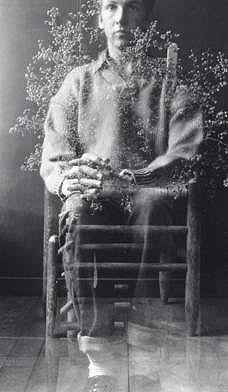
Robert Rauschenberg: Postcard Self-Portrait, Black Mountain (I) (1952)
"I ain't no action figure."
I do not behave like a standard action hero might. I decide, then slip into a period of concerted Cogitating before acting. It might even appear to the inexperienced that I do nothing at all in response to deciding, that I'm not living up to my commitment. It might even appear that way to me. I could get moody until I give myself over to accepting what seems to be my usual response to deciding something. I flee to my head, deep within my head, and commence to Cogitating. I might insist that I'm thinking then, except I cannot be certain whether I'm thinking or not. I remain uncertain what thinking entails so I cannot tell if I'm engaging in that. Cogitating might be more a meditative than a thinking state, meditation being an immersive but not necessarily an analyzing or deconstructing one. I tend to float away from key choice points having chosen but not yet ready for action. I tell myself that my Cogitating prepares me to take right action without wasting effort with hasty reactions. I tell myself this story without really knowing if I'm telling myself the truth.
The truth might be that I have no good reason, no clear justification for slipping into Cogitating inaction following making a decision.
Gatekeepers

A gatekeeper at the Srivaikuntanathan Permual Temple
"The Gatekeeper administers the first test."
I feel as if I might have wrestled the content piece of Authoring to a rough ground over the past week. The publishing software finally gave up her secrets and I assembled a second manuscript and commenced to reading into if not yet through it. I maintain a queue of future compilings and a rough process by which to achieve them. I feel a little bored, which suggests that it might probably be time for me to open another front in this Authoring effort, the front where I commence to contacting Gatekeepers.
Gatekeepers terrify me. Always have.
Author-itative

Forged self-portrait of Albrecht Dürer.
" … never muttered another word thereafter."
We've long known that giving a guitar to a twelve year old dramatically increases the risk that said twelve year old will start crafting verse and become, at least in their own mind, uncommonly wise, and then start dispensing advice and spouting "folk wisdom." We understand less well a similar effect resulting from teaching someone to write. The risks might be tiny, but nonetheless exist, that the budding writer might discover urges to become an author. If so, it seems a short stroll down a fairly well-trod path before said writer comes to take them self seriously, perhaps all-too seriously, and steps over that line where ever after they think of themselves as authorities and so come to speak almost exclusively in the curious dialect favored by the Author-itative. They become bores and/or whores, assuming any of scores of similarly degrading roles in society. Extreme cases might be seen guest spotting on CNN, MSNBC, or, shudder, Fox. They might even sell a lot of books.
I have personally seen how this gift of writing can evolve into the curse of Author-itative prose.
Haunts
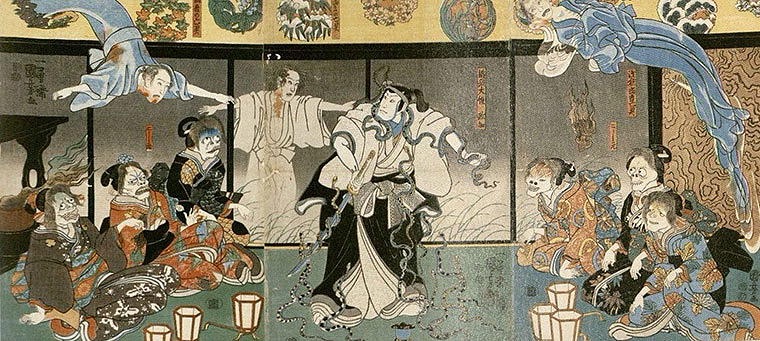
Utagawa Kuniyoshi: The Ghost of Asakura Togo (undated)
"Exclamation Point! Period."
If I possessed the power to give advice that might be heeded rather than mocked by people younger than I, I would find some way to convince those folks that they author their own stories. Because of this one fundamental fact, we might be incapable of victimization without our own active collusion. Plot twists notwithstanding, if we're each authoring, then we get to decide where to place the final piece of punctuation that designates the end of one of our stories, nobody else. An adage much older than I insisted that no story ever need end up a tragedy if its author simply waits until an uptick before calling the story quits. An uptick always seems to emerge, however modest. I won't argue that this world does not host true tragedies, absolute calamities, but I will insist that these are never necessarily the whole or essence of any story, and that it does everybody some good if the soul of a mangled body gets reported as transported to heaven after its fall. That's what Authoring contributes, and it's fundamental.
Not everyone—or even most—take the Authoring notion as far as actually writing anything down, but we all seem to collect our stories.
Authorthentic
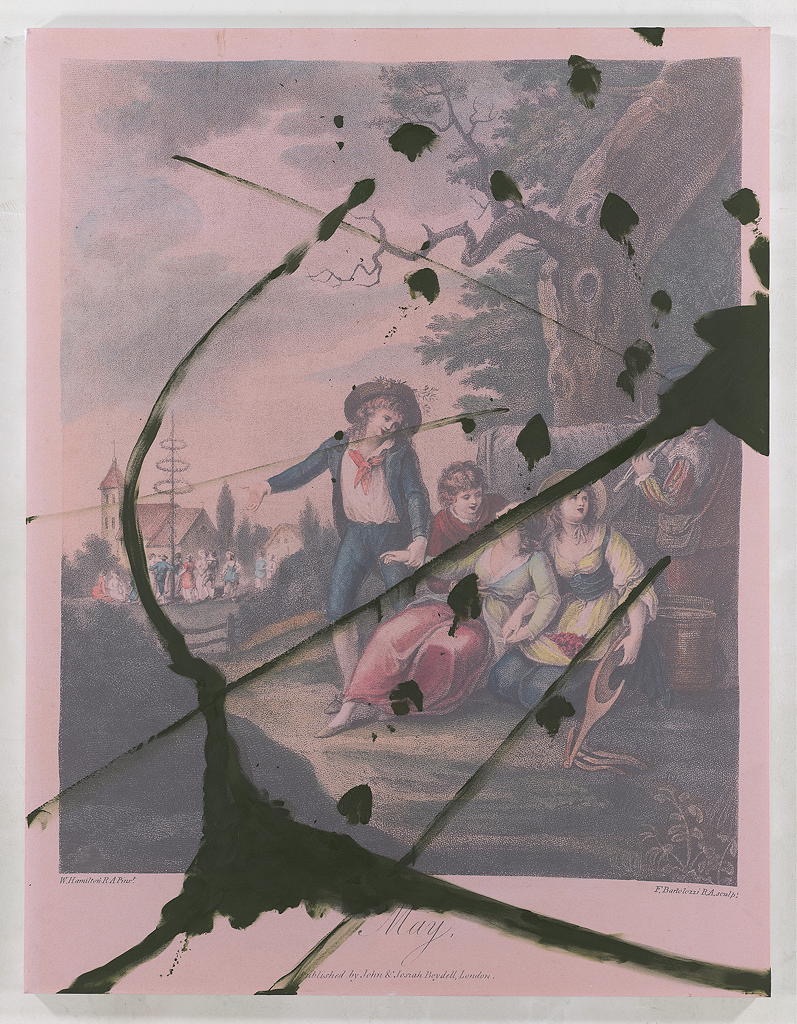
Julian Schnabel: May (2017)
"I will be rewarded with a blank page …"
I admit to feeling self-conscious about how I write. This likely stems from my never having received formal training in how to write, so I suspect that I do not write properly, or right, and never have. When I say that I feel self-conscious about how I write, I mean that I usually go unconscious when writing so that I won't be thinking about what an imposter I'm being while engaging. There's a deep shame there, too, as if my act of writing should necessarily seem offensive to you and that I really should, if I were in any way thoughtful, gift this world by not further polluting it with my misbegotten work products. I do not overstate my premise here. I want to be clear about my experience. I might choose to write in what passes, for almost everybody, as the middle of the night because my practice, my actual Authoring, probably wouldn't pass muster in the fuller light of any actual day. This part of my life seems best lived surreptitiously. Once the Authoring's finished, I feel free enough to post the result without often mentioning the process by which it manifested, a process which might well be shared by every author in the history of this world so far, though not often mentioned to their readers.
Maybe cost accountants perform a similar dance when they create capital asset pricing models. They probably should.
OpServing

Antoine Le Nain: Les Village Pipeaux [The Village Piper] (1642)
"I'm some days tempted …"
I'm taken by the differences between the life I described two years ago and the life I live today. This continuing Damned Pandemic has completely if subtly changed how I live. On my better days, I imagine myself on a mission, serving my country by observing strict protocols so as to do my part to inhibit the transmission of the virus and all of its variants. I duly upgrade my mask as suggested by the CDC. I mostly, and some days most excruciatingly, just stay home and look out my window, an OpServer more than an active actor in this world anymore. I've become a subvocalizing scold when I do venture out, pissed at all the maskless freeloaders dogpiling upon society, extending our travails, cynically shirking their civic responsibility. It would be easy, too easy, to acquiesce to the general ignorance displayed and just play along, give up, expose my position and volunteer to become a lab experiment that could quite easily kill me forever. Instead, The Muse and I keep driving, deciding when we see the overflowing maskless crowd overfilling our local tavern, to go find some more abandoned-looking business from which to order some supper to go. We even eat out at home now.
As a writer and a budding author, I some days struggle to feel as though I describe a world shared by anyone else.
Colluding
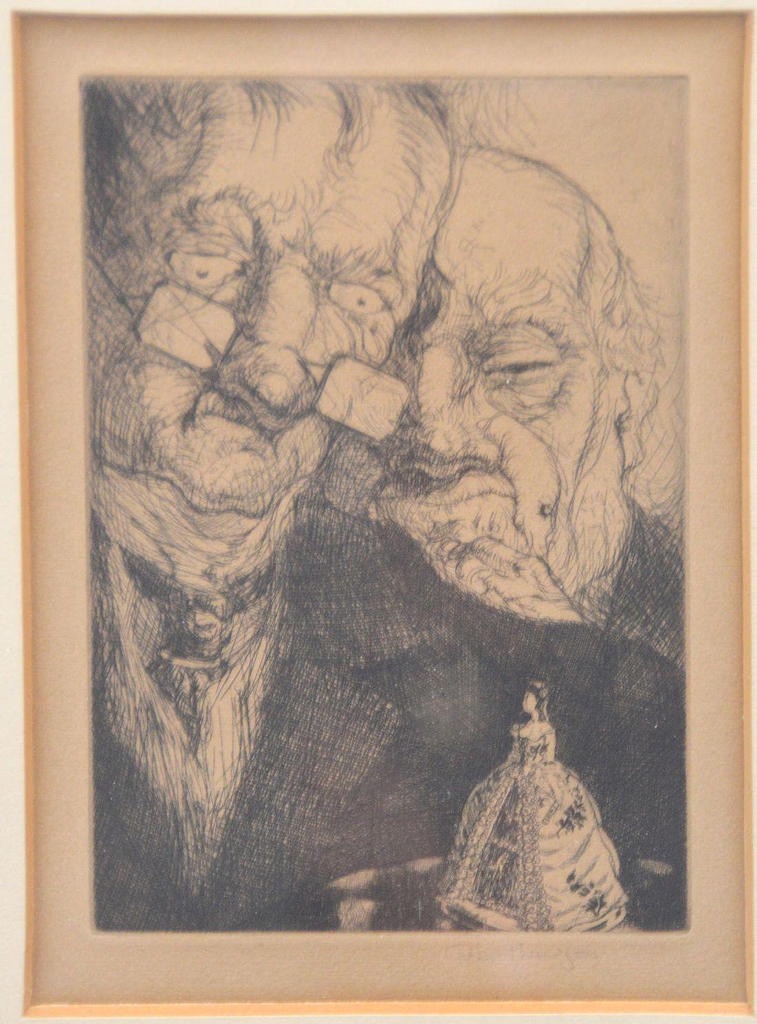
Robert Lawson: original etching, titled “the connoisseurs,” (undated)
"A conspiracy's gaining steam."
While writing tends toward an isolated and, indeed, isolating endeavor, Authoring becomes necessarily more social. It might take a village to bring any work to publication and distribute it beyond its author's orbit. Even in this age of viral transmission, those lowly-seeming individual producers usually have a community contributing and supporting their efforts, colluding in dozens of different little ways to make a real difference. In some ways, these helpers find their own way inside the author's circle, even when they're invited in, for these endeavors rarely seem terribly promising at the outset. Invitations get sent without great expectations that they'll be be warmly received, without knowing who might insist upon taking a lead. The resulting community expands organically, fueled by each member's own interests. In this sense, the Colluding seems inherently beneficial, occurring only because there's really no other way to get such things going. This describes what I've long referred to as a ProjectCommunity, a benevolently Colluding conspiracy of dunces intent upon becoming geniuses. Screw projects, we'd much rather collude and conspire.
As a writer untrained by formal writers' workshop orientation, I most fear the critics.
Dedication

John Singer Sargent: Gassed (1919)
"The universe has seemed dedicated to thwarting my forward momentum …"
It seems simply axiomatic that any attempt to accomplish anything novel attracts imps, so I should not feel in the least bit surprised that every attempt to delve more deeply into Authoring has encountered frustrating complications. Trusted software fails, or seems to, then mysteriously seems to heal itself after stalling progress for a couple of days. The mere act of plugging in a faster printer, borrowed from The Muse's office, appears to have uncovered a malware infestation which then mysteriously disappeared. Small steps seem more like stumbling blocks and every damned thing I attempt to initiate becomes either another damned thing or the same damned thing all over again. I recognize these experiences as standard Dedication tests, apparently necessary encumbrances intended to test mettle and stomach. If I cannot swallow these tangles, I might consider aborting my mission now, because worse will very likely be coming, and worse in ways that would certainly prove intolerable today, but following some initial conditioning, might well prove to be less than overwhelming. I've been building up immunity to terminal disappointment by seemingly serially disappointing myself.
It seems a wonder I've made any progress, given that I feel as though I've mostly been encumbered from moving very far forward.
Timelessnessing
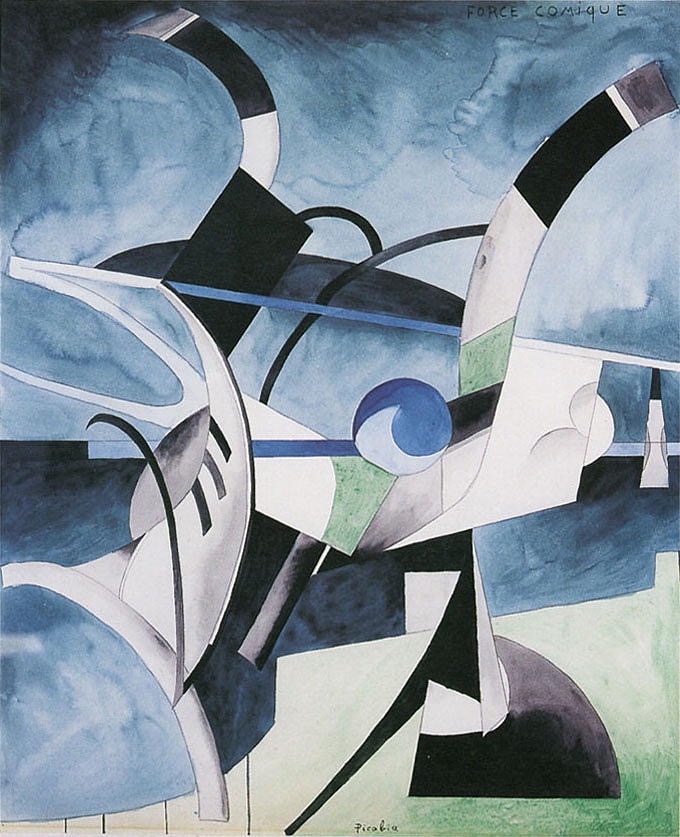
Francis Picabia: Force Comique (1913–14)
"Time's a jealous one …"
Authoring, like writing, can be time consuming. I might spend three hours crafting a single thousand word essay and exhaust a few days assembling a quarter's accumulation of posted pieces into a draft manuscript, then a few days proofing that manuscript, a few hours correcting the master manuscript, all that before releasing the semi-finished work to broader review and critique. The process, if, indeed, it qualifies as a process, seems interminable and I suspect that it's actually impossible to maintain much enthusiasm for a work that takes so damned much effort to produce. There's just something about working hard that encourages moving beyond the effort and into well-earned leisure, but writers and authors do not work for the purpose of not working any more, or they sure don't seem to. They seem to work for the purpose of continuing to work, for properly engaged in, their, our, work might be better labeled play. What do I do for work? I play, but only when I remember that I can make it that way.
Any time-consuming anything tends to weigh heavily upon the one engaging, for time, a concept apparently without physical substance, weighs more than any other material.
Learnering
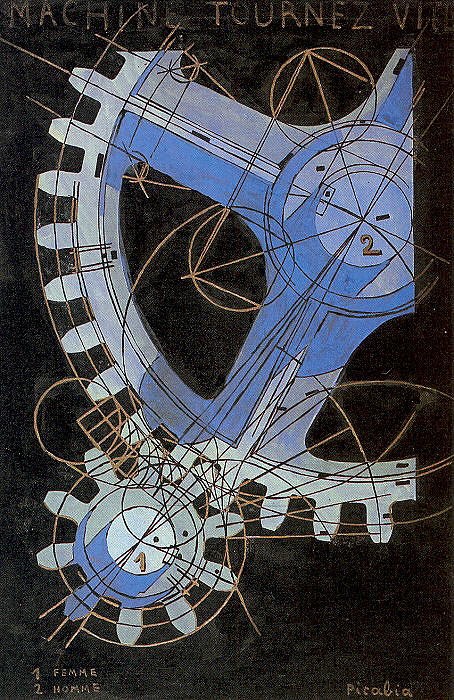
Francis Picabia: Machine Turn Quickly (1916–1918)
" … even more humiliation before me …"
I know of no more pitiful state than that of a learner. The learner hangs suspended between two states: ignorance and understanding, where the presence of the former becomes ever more prominent and the absence of the latter becomes ever more apparent. No resolution resides within the learner's space. Were there a process by which one might gauge progress toward understanding, the experience might feel different for the learner, but, alas, no such process exists, though competing theories about what that process might be continually add to the irresolution. The learner's experience tends toward the chaotic with resolution uncertain. It's a genuine wonder to me why anybody ever volunteers to learn anything. Ignorance being bliss seems a damned good argument against all forms of learning, and I mean this.
Once the learning's completed, one might hold some chance of being recognized as being learned, at which point the fresh scholar might lord their superior understandings over others, thereby earning their eternal enmity.
Relearning
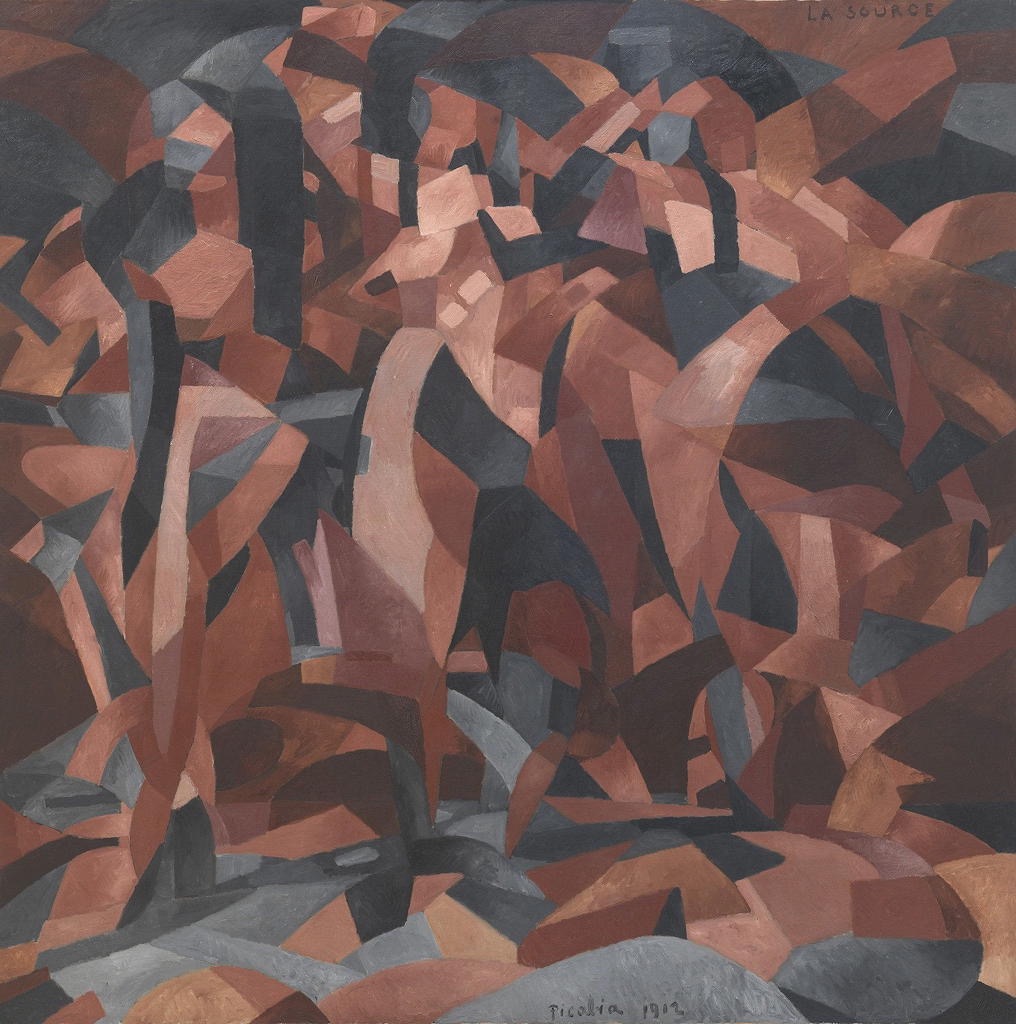
Francis Picabia: La Source [The Spring] (1912)
"This Authoring crap ain't for wimps"
It might be a feature of modern times that I seem to have only fragmentary understanding of how most things work. I know enough about automobiles, for instance, to drive them, or many of them (not Buicks), but not enough to fix them should they break. I tried at one point in my life to learn enough to be able to perform simple periodic maintenance on my vehicles, but vehicles have changed since then, and even then, I was prone to making mistakes when taking care of my cars. It's genuinely difficult to clean up a four quart oil spill in a driveway after discovering that you forgot to replace the drain plug before attempting to refill the crankcase. Difficult and embarrassing.
Most of the software that I use, I understand no better than I understand automobile maintenance.
Howsing
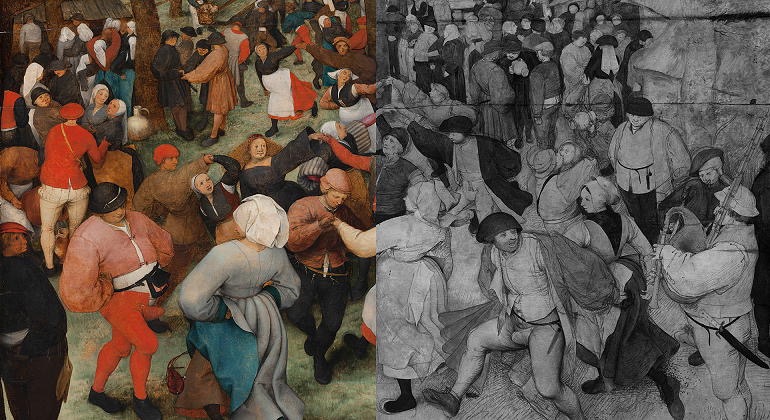
Pieter Bruegel the Elder: The Wedding Dance (1566)
" … new worlds emerge."
I caught myself, while proofing that latest manuscript, reading for something other than story. It's usual for me, when picking up a book, to read for content. Style might enter into my perusal, but never most prominently. I'm following the story, hoping that the author's word and phrasing choices won't unduly encumber my effort. Ideally, when reading, the style should remain essentially invisible, like a neutral wall color, there to frame the content never to overshadow it. But proofing my own writing, I already know the story. I'm learning that the story pretty much takes care of itself. This time through the work, I'm looking a little deeper than story at the technique, the style, the manner of describing I employed. Does it exhibit the necessary consistency? Does it encumber the story? Does it adequately hold the space?
I guess that the style of writing sets a context, and context tends to deeply influence everything around it.
OpeningShop
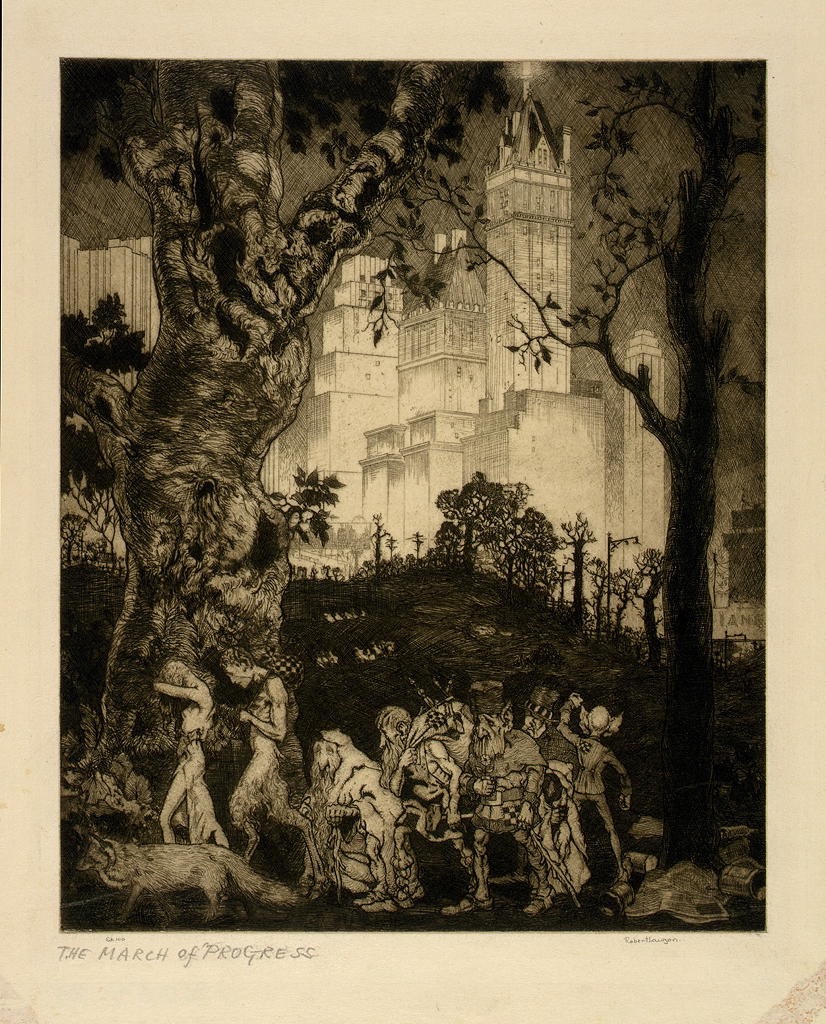
Robert Lawson: The March of Progress (circa 1930-1931)
" … further tedious justification …"
I discovered what I always discover when I finally finished circling the spot and settled into reading the next of my "finished manuscripts." The first few pages proved awkward reading, but before I hit the fiftieth, I'd settled into the rhythm of the writing and caught myself almost enjoying the experience. The autobiographical element proved very attractive for me, for it enabled me to relive past experiences. The pieces were spare sketches but lifelike enough for me to recognize myself, or a part of myself, passing by before my eyes. Short of a mirror to peer into, what could possibly prove more diverting and interesting? The flow of the work, which I'd anticipated might prove choppy, wasn't. It seemed to pretty much work, though I'd need a book designer's eye to confirm this impression. I expected to find further excuses for not finishing the work, but I stuck to it instead, which left me feeling as though I'd opened up another department in my book producing operation. I was OpeningShop.
I have spoken here before about how I tend to catastrophize upcoming effort.
Show&Tell
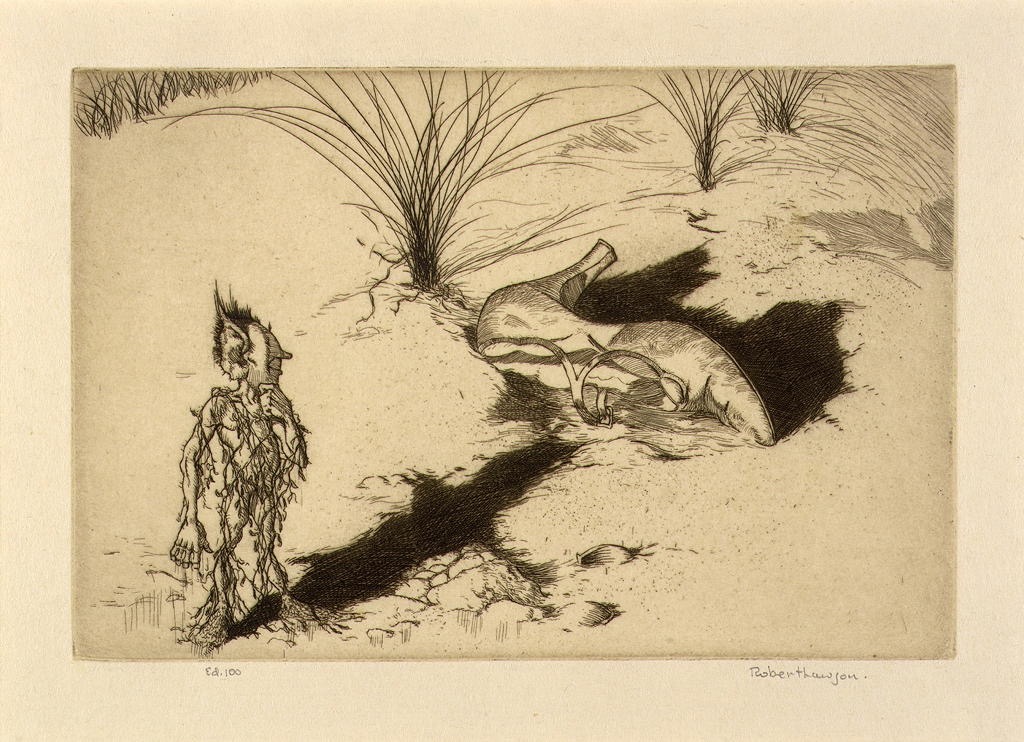
Robert Lawson: Little Elf by Big Shoe (not dated)
" … hopefully not Arithmetic."
I have a lot of material, much of it uncatalogued. Twenty years ago, I had several file boxes filled with pieces I'd written. I still have those, unopened in the interim, and several times more volume, newer stuff, less accessibly filed. I figure that most of all of that stuff was practice, warm up pitches honing my approach. I was preparing for the day when I might be called upon to commercially create, in the bigs, but that call never came. I remember the shame I felt when I first considered submitting pieces to journals only to find that my inventory was thin. I set about trying to fill it in and may have gone a little overboard. I feel like a hoarder now, squeezing between piles of finished material so randomly organized that little within it could ever be located. It's a random access filing system where the product of every search can only be randomly selected.
I created perhaps a quarter of the material in now obsolete apps, ones for which nobody seems to make translators anymore.
TwistingPlots
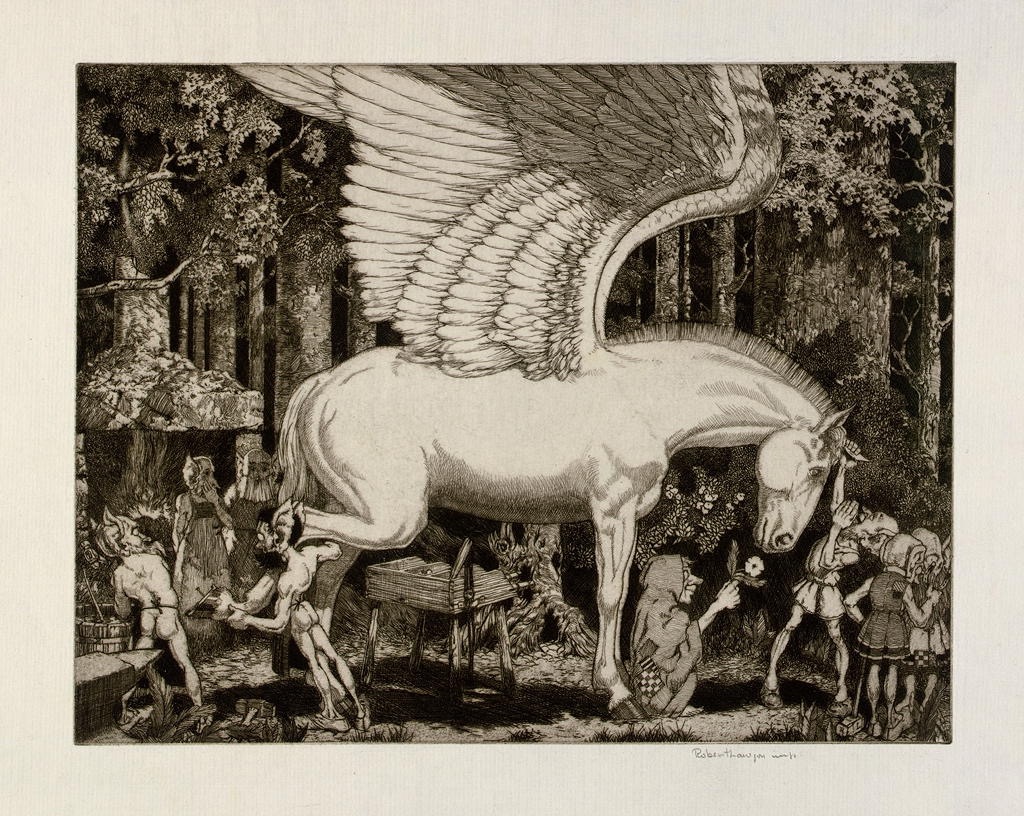
Robert Lawson, Pegasus (not dated)
" … Unbelievable …"
The plot twist might qualify as the most over-used literary conceit. Plot twists should appear only when absolutely necessary and should generally be less dynamic than most authors seem to presume. One need not necessarily rip the wings off the plane to affect a serviceable change of course. A wing-shedding turn might most properly be reserved for a once in a lifetime event, and even then, will very likely seem overplayed.
The general rule for believable fiction differs from the same rule for non-fiction, or what's posing as non-fiction.
InnerAuthor

Robert Lawson: "Uncle Phineas was wrapped up most comfortably, smoking his pipe..." (1945)
[Perhaps a self portrait of the Author/Illustrator]
"The leather elbow patches make the real difference."
Though I have authored several manuscripts, I do not very often feel very much like an author. What does an author feel like? I thought that I might poke at that question this morning, for I seem to have an InnerAuthor inhabiting if not my body, then my spirit. When I can sense his presence, I catch myself behaving more authoritatively, more like the InnerAuthor I hope I embody. At other times, I feel far separated from that sense of that particular self, and I wallow rather hopelessly. My InnerAuthor represents my exemplar, the guy I aspire to become, my spirit guide. Every writer ever published seems to have believed that a multitude inhabits each person's psyche, each personality passing for 'me' for a time, all true yet none definitive. My InnerAuthor fits right into that characterization. He exists for the purpose of inspiration, not definition. When I'm channeling his presence, the label of Author just seems to fit. When not, it doesn't.
My InnerAuthor most closely resembles Robert Lawson, an author and illustrator who published through the first half of the twentieth century.
Fallowing
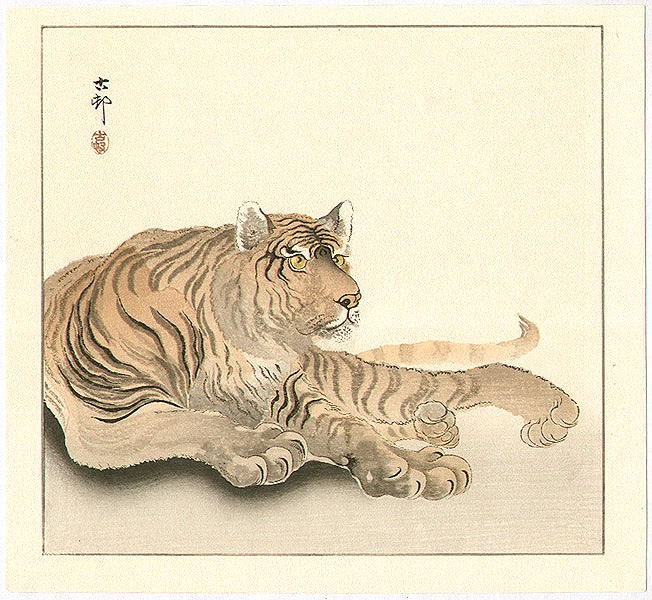
Ohara Koson; Reclining Tiger (Ca. 1910s)
" … up to perform my daily writing ritual …"
I am occasionally accused of appearing to be productive. I sincerely apologize for this appearance, but I assure you that the productivity seems to reside in the eye of the beholder. I consider myself a first-class slacker, rarely if ever doing very much of anything, though I might occasionally tag along on some adventure, but almost always strictly as an observer. The recently completed Grand Refurbish serves as just the most recent example of just such a misrepresentation, for I contributed little on that one and feel as though I mostly received credit for effort my hired crew performed. I added a few grace notes but little of any substance.
Still, that said, I also very rarely allow myself a day off.
AlreadyBeenDone
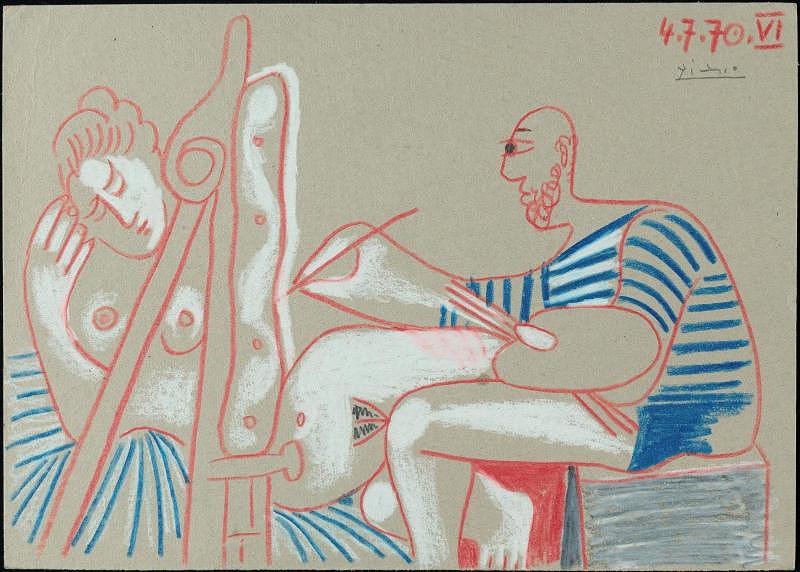
Pablo Picasso: Le Peintre et Son Modèle (1970)
"I do not want somebody different greeting me now."
Picasso had what some might have considered a very bad habit. He insisted upon producing paintings that had AlreadyBeenDone, often by painters judged far superior to him. Who could count how many 'painter with his model' canvasses he produced? Certainly scores if not hundreds, each one replicating a pattern at least as old and done as any subject he could have imagined. Authors do this, too, I'm moved to reflect. Someone once postulated that there were no more than six original plots in existence. Six plots to cover the entirety of human history in every language. The likelihood that my book or yours will introduce that long-elusive seventh plot seems unlikely, if not utterly impossible. It's common for an aspiring author, though, to notice that he's not been totally original and perhaps borrowed a few features from another author, one he's in awe of or jealous of. What constitutes an original work and where might plagiarism begin or end?
We're all, it seems, standing upon each others shoulders.
Juggling

Fritz Beinke: Der Jongleur [The Juggler: A Village Fair] (1873)
" … some soul-crushing effort."
Juggling separates writing from Authoring. Writing can occur within a variety of mediums. One need not know how to use Microsoft Word to write, as I daily demonstrate. Indeed, some of our most celebrated writers employ pencil and paper to craft their works, but since published works almost never simply photocopy an author's scribblings, some transformation from the original must occur and this does not happen without expending considerable energy, either the author's or someone else's. Indeed, each transformation, each shift of medium, also demands a proofreading pass, this usually requiring a higher skill level than the one performing the migration between mediums. Even moving writing between one software application and another introduces considerable complication into manuscript creation, since different apps tend to interpret the same intentions differently, producing formatting nightmares. I have yet to discover a single application that satisfies all the different demands a single manuscript must satisfy to pass muster, so the writer, or his staff, must engage in considerable and prolonged Juggling to produce a passable manuscript.
Writers as a class despise Juggling their work product.
Deadlining

William Blake: The Tiger from Songs of Experience (1794)
" … right on time, in a photo finish … "
As a writer, I mostly work without the distraction deadlines bring. I have no publication date looming, no external expectations goosing me forward other than the rather tacit and largely unknowable desire my readers might have to receive my latest posting. I quite frankly don't think about that very much. The question of whom I'm writing for rarely comes up and my response rarely changes. I'm usually writing for myself and for future generations, neither constituencies terribly demanding. But once each year, I write on deadline, Deadlining, if you will. My Christmas Poem Cycle, twelve big fat juicy ones which must, according to the constraints I've constructed around the effort, emerge between Solstice and Christmas Morning. It's Christmas Morning as I write this essay, and the scent of Deadlining still clings to me.
I notice these last few days have felt different than my usual routine, though I've tried to maintain my regular routine underneath my Deadlining effort.
BreakingRhythm
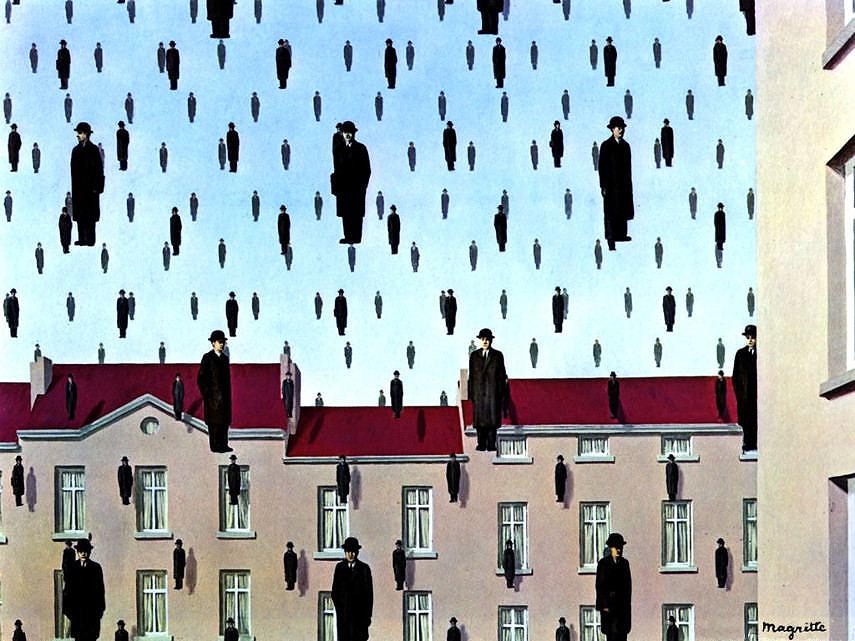
Rene Magritte - Golconda (1953)
"I might break my stride or bust a rhyme and improve the quality of my experience."
In June 2000, London's Millennium Bridge opened to flooding crowds. Unpredicted by anyone associated with bridge design or construction, the mechanical resonance of the crowd's movement set up a small swaying within the structure. This movement further encouraged a kind of sympathetic resonance within the crowd, whereby people began walking in lockstep, further amplifying the bridge's swaying. Nothing came of this event, other than that the bridge was shut down for inconclusive investigations for the month following its opening. Way back in the 1840s, some soldiers marching across a Scottish suspension bridge, brought down the structure and ended up in the water below when their marching's mechanical resonance, much like that Millennium Bridge's crowd's, matched and amplified the bridge's. Soldier now commonly break stride when crossing a bridge to prevent such occurrences.
Writer's, too, maintain a cadence in their production.
Ledda2duhEduhduh
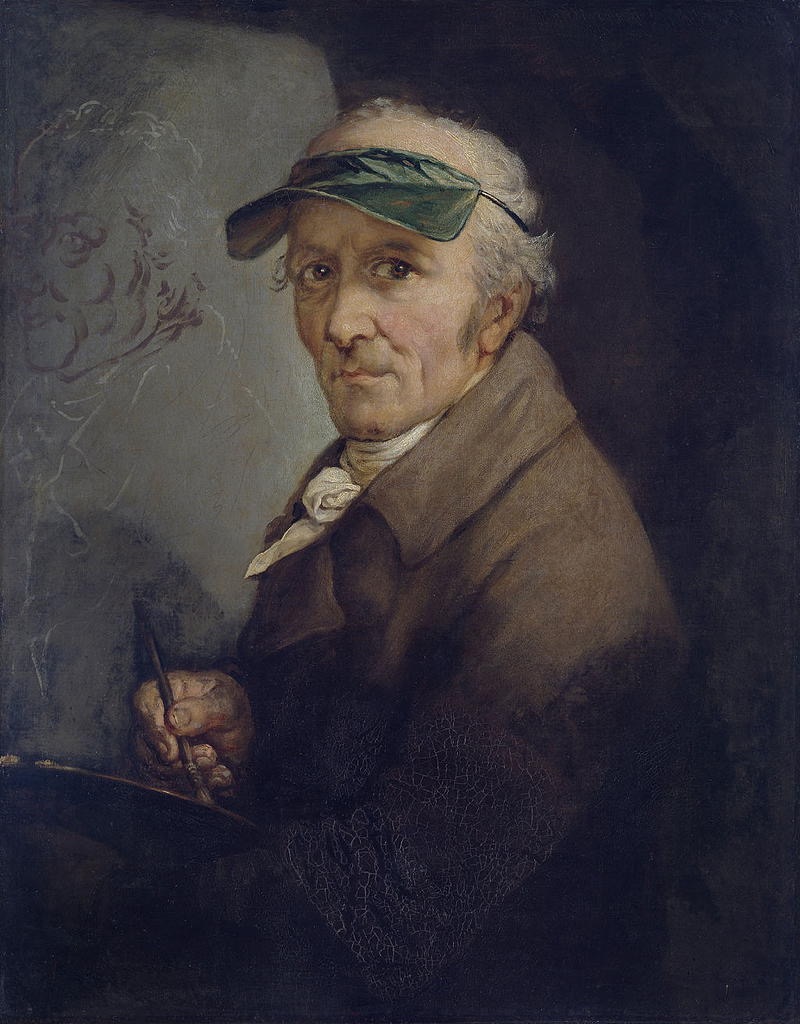
Anton Graff: Selbstbildnis mit Augenschirm [Self-Portrait with Eye-shade] (1813)
" … actual ink on actual newsprint."
The easiest ink this author ever gets comes from having a letter published in the local paper. It doesn't amount to much of an accomplishment, but I admit that I take great personal pride in it, reading the result over and over again as if marveled by its very presence. It seems precious to me there as I stare down at the same old page made wondrous by my letter's presence.
The local paper will publish almost anything submitted by any reader, and about a quarter of those they do publish appear have to been submitted written in fat primary crayon, probably with the 'r's transcribed backwards.
InauspiciousBeginning
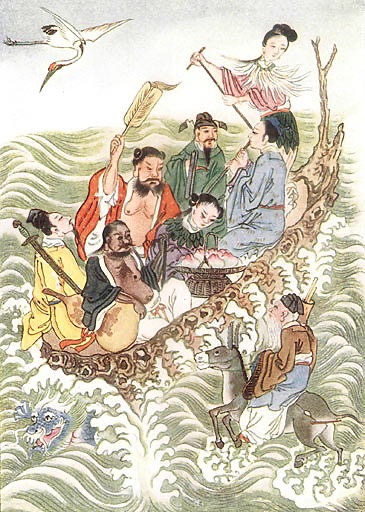
Werner, E. T. C.: The Eight Immortals Crossing The Sea,
(1922) [excerpted from Myths & Legends of China. New York: George G. Harrap & Co. Ltd]
" … a thousand lenses absorbing orthogonal perspectives, sending mixed messages."
I'm nobody's soothsayer. I cannot foresee anybody's future, much less my own. Furthermore, I don't really want to know what's coming next. Maybe I want to be ill-prepared when my future finally shows up. Maybe I just don't care, but I've organized my life more around the here and now than any there or then. I have aspired to little more than to do my work and be with my family and friends, though our Damned Pandemic has been straining ties to family and friends. I made that call day before yesterday to acknowledge that we would not be congregating for this upcoming holiday, either. The Muse and I are long distance grandparents, even after we managed to move back home.
As those of you who have followed my postings already understand, I fancy myself a writer.


